Tell Your Story: Telehealth Allows Access to Meet More Needs in the Community
October 22, 2020
The need for Behavioral Health care has increased significantly during the pandemic and services have been provided primarily via telehealth. While necessities of physical distancing during the COVID-19 pandemic led to this increase, virtual visits have broken down barriers to care and are helping improve health equity. Telehealth visits makes it possible for Access to meet more needs in our community, and will become a mainstay of the care we offer to patients moving through the pandemic period and beyond.
Our patients are incredibly resilient and have endured many stressors and adverse experiences while navigating the pandemic and everyday life. Telehealth allows us the opportunity to offer increased access in many ways to meet patients where they are. The Behavioral Health team has adapted quickly with compassion and teamwork that demonstrates a deep commitment to Access’ mission. I am proud to be a part of such a dedicated and committed team and look forward to navigating the challenges ahead together.
~ Elizabeth Zeidler Schreiter, PsyD, Chief Behavioral Health Officer
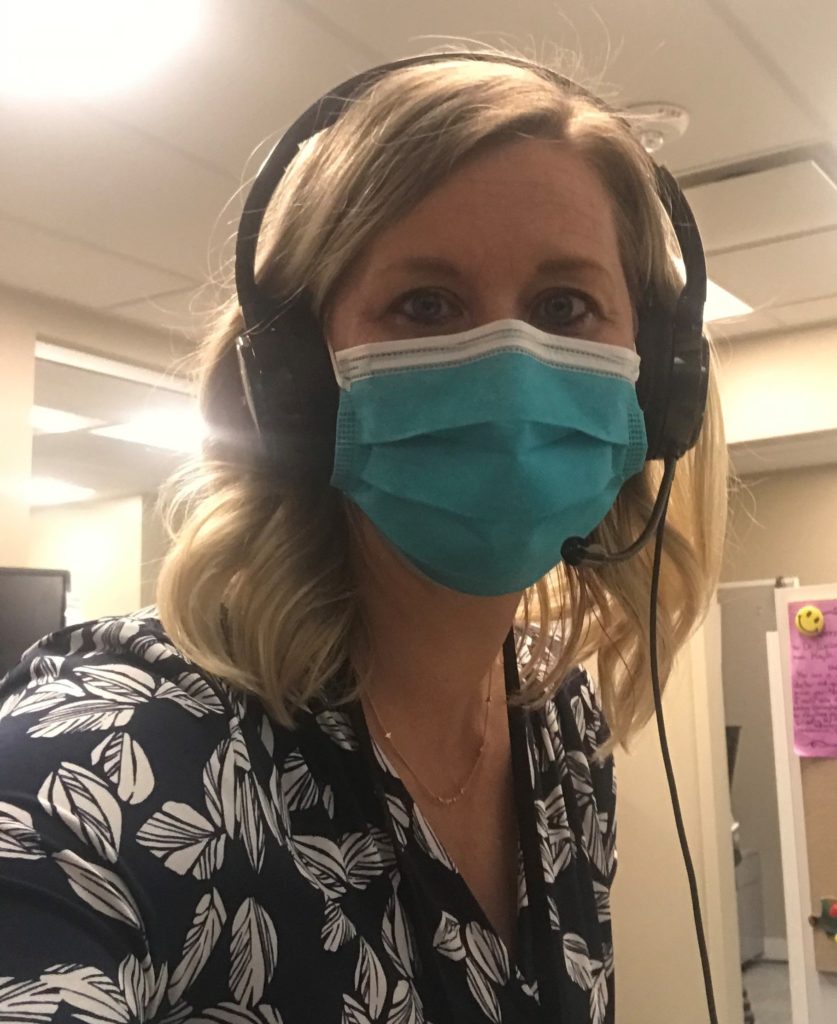

Tell Your Story: Building Relationships with our Patients
October 15, 2020
Registration has continued to build relationships with our patients. We are constantly being told that we are like family and that is nice for our patients to come in and see that familiar face. Our patients feel more relaxed to come to their appointments and often let us know what is happening with their families and like to joke around with us. We get excited to watch our prenatal patients from the beginning of their pregnancies to the birth of their child and watch their kids grow up. We take a lot of care and pride in remembering the names of our patients as well. If our patients have any difficulties with scheduling, trying to figure out what services they need then our registration is instrumental in figuring out what our patients need and who to connect them with.
Our clinic had extended the COVID discount to all patients that were in need during tough times, and our Community Resource Specialists pre-screen patients to see if they are eligible for any insurance plans.
I have witnessed the love and care that our providers have shown our patients. I have watched Dr. Poi who loves her patients so much that she walked one of her youngest patients out to their car while the toddler was asleep on her shoulder. I have seen Dr. Hoerz give all his time and attention to a homeless patient in the Respiratory Clinic to make sure that she received assistance for housing, medication and food. This patient was there all day and she was well cared for until he could ensure she would be ok. I have witnessed Dr. Doherty and Dr. Weiser and Dr. Shapiro all be so caring and take the time to not only care for their patients, but also make sure they are well informed on their next steps of care and make sure that patients have the correct educational materials. Our doctors show that they are very compassionate and that they love their jobs.
~ Victoria Sutton, Patient Services Manager
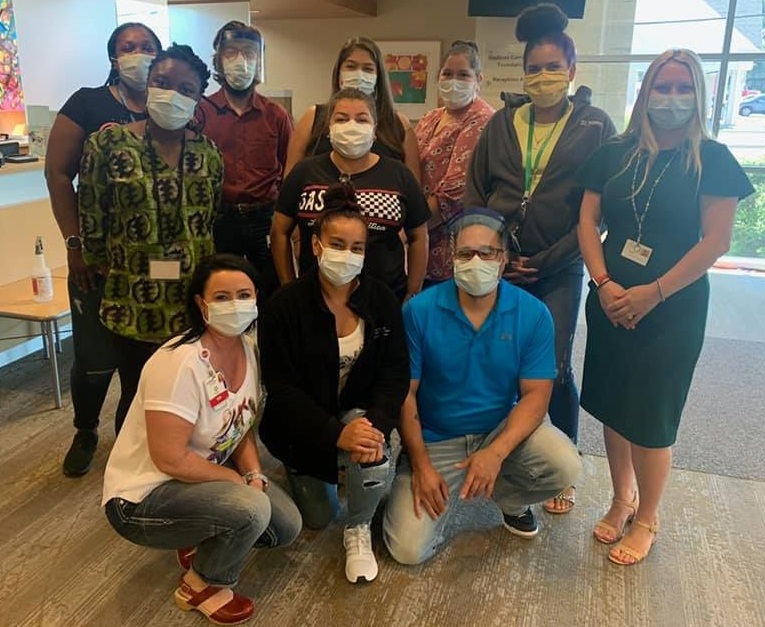

Tell Your Story: We’re Here to Help People
October 8, 2020
One of the most memorable and satisfying patient encounters I’ve had during COVID was evaluating a man at respiratory clinic for ear pain. He was directed to our respiratory clinic because of algorithms designed to keep everyone safe.
We already take full social distancing and disinfecting precautions at all of our locations, but we want patients with respiratory symptoms to be seen separately from patients with other types of health concerns in an effort to further reduce the chances that someone will be exposed to COVID at our clinic.
A man with ear pain was seeing me in COVID clinic, and so I was wearing my full PPE uniform when we met (N-95 mask, face shield, etc.). As he described his three months of ear pressure and muffled hearing in the left ear, it didn’t take either of us very long to realize that he probably didn’t need to be seen in respiratory clinic. One look, and I reassured him that his symptoms was from an ear wax blockage in his tympanic membrane.
Our team got right to work. The first attempts helped, but there was still a blockage in his ear canal. I followed up with curettage, asking the patient to hold back the top edge of his ear lobe to help me get a better look at our target. After some gentle digging, I was able to dislodge an enormous impaction. The moment the cerumen came free, I saw the patient’s eyes widen in relief and could tell that he had an enormous smile behind his facemask. He was so grateful to have the obstruction gone, he nearly hugged me, but my PPE reminded him to check that impulse. He issued a flood of “thank you’s” and was practically skipping when he left the office. I shared his gratitude with the rest of the respiratory team that day, and it lifted all of our spirits to have been able to help someone in such an immediate, tangible way.
We are facing so many problems without clear solutions right now. We have so many barriers to forming our normal connections with other humans. That simple interaction at respiratory clinic helped remind me of why we all come to work every day. We just want to help other people. And Access has taken every possible approach to make sure we can still do that safely during this pandemic.
~ Julia Weiser, MD
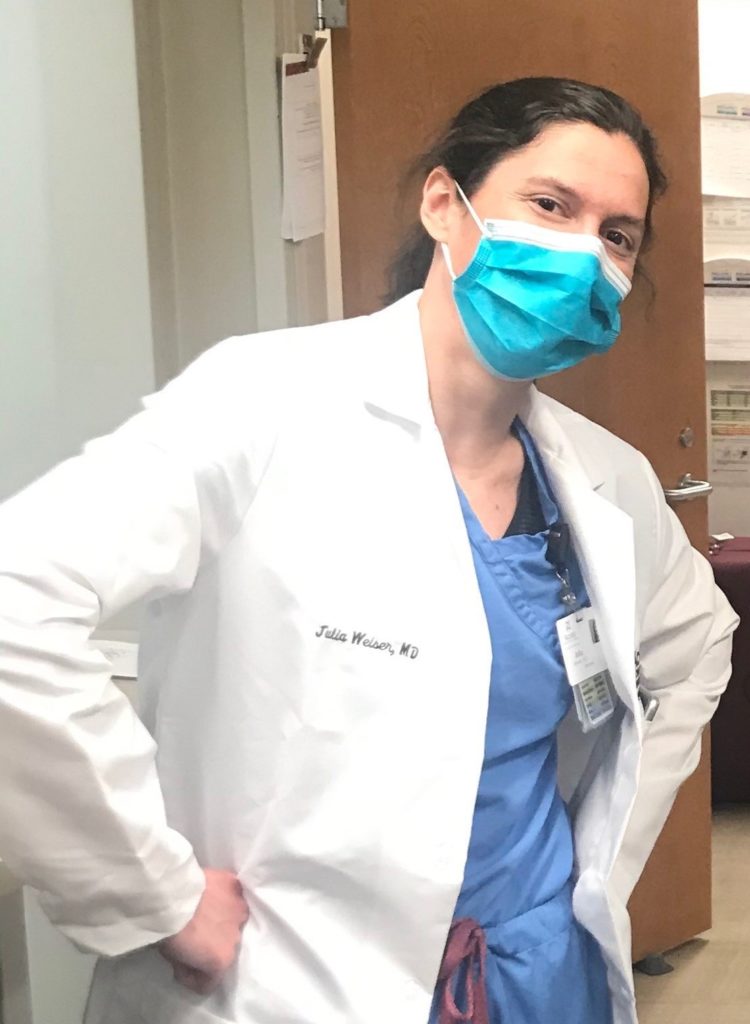

Tell Your Story: Vital Care that Makes a Difference
October 2, 2020
Each day we go to work and talk to people who matter-of-factly relate experiences that make it obvious that our work is vital, and that health care, economic and racial disparities are real and deadly. One patient last week told me she had lost six family members to COVID-19. One today said they had lost three – two of them health care workers. One man told me he had stopped counting how many people he knows who have died because it is too depressing.
One of my patients who survived COVID-19 can’t get off oxygen due to scarring in her lungs. Another died, leaving several foster children with no one to raise them. She worked two jobs to support these kids. Another developed multiple blood clots in her lungs, almost died, and is on blood thinners for three months. She is terrified to return to her job as a CNA at a local nursing home where she, other workers and several residents were also infected. She lost her insurance while hospitalized, is now enrolled in BadgerCare, but cannot pay her rent and is being evicted.
Every day we meet with those who are doubling up households when they lose their jobs, who may be working two or three jobs as essential workers, and whose exposures are increased as a result. I know our care is essential and that we are making a difference.
Sarah Rowe, Nurse Practitioner
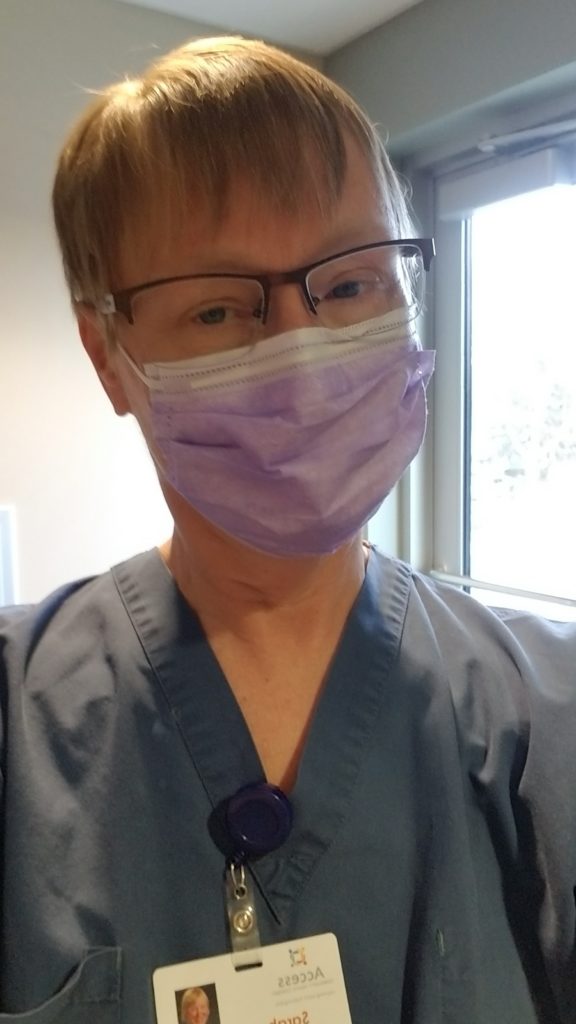

Tell Your Story: Teamwork to Provide Exceptional Care during COVID
September 24, 2020
We were able to provide essential care for a patient with a significant language barrier. He is deaf and also lacks fluency in both English and Spanish. This existing barrier is further complicated by our current protocols for PPE use, as he could not read lips as he is accustomed to doing.
The interpreter team developed an effective plan for managing this barrier to care in advance of the appointment. We discussed the plan with the dental registration staff so that they could pair him up with the appropriate care team. Our assisting staff did a wonderful job making the patient feel comfortable throughout the procedure. This allowed us to effectively diagnose his issue, remove the tooth that was bothering him, and relieve him of the pain and infection from the problematic tooth.
This demonstration of interdepartmental teamwork allowed us to overcome several barriers, demonstrated the genuine compassion we give our patients, and provided a great opportunity for this patient to receive much needed dental care.
Jean Hull, Dental Services Manager
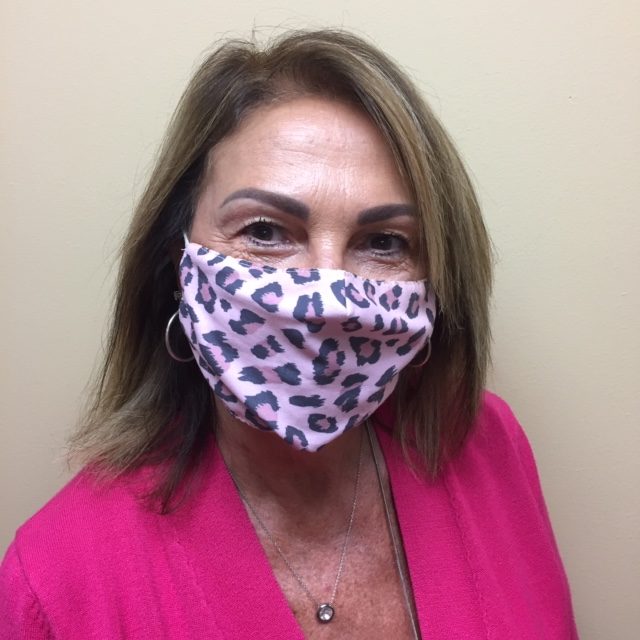

Tell Your Story: Providing Compassionate Care at our Respiratory Clinic
September 16, 2020
Our Respiratory Clinic at Access has been set up to allow us to not only test patients for COVID when needed but also to provide primary care services to people with symptoms. The way our clinic space has been set up and the staffing that we provide allows us to go well beyond what can be offered at a drive-up testing site. Our care team collaborated to help a patient with needs well beyond what could be managed from a car. A female patient with severe persistent mental illness and homelessness presented to the clinic with the new onset of a cough. Yes, she needed to be tested for COVID. But she also needed support to manage her suicidal thoughts and a housing option to allow her to self-isolate. Our team spent most of the day working to get this patient the mental health care and housing that she needed. The name “Respiratory Clinic” does not begin to describe the extent of the compassionate care provided by the Access care team.
Kevin Fehr, MD
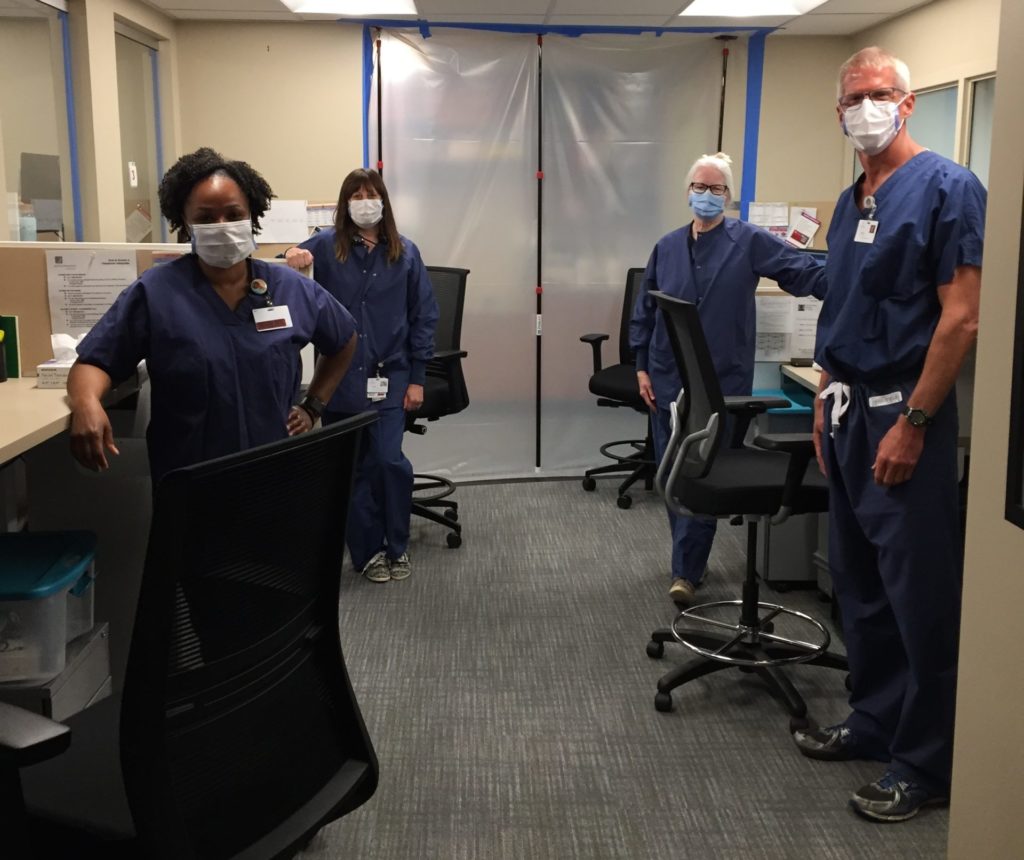

Tell Your Story: Patient Resources make a difference
September 2, 2020
In the past few weeks, agencies have strengthened and fostered the word community. Many agencies have changed the way they work, to meet the needs of a population experiencing economic instability and food scarcity. Over the last few weeks, I’ve met with patients who have been unable to pay rent due to loss of income. I’ve helped these patients apply for rental assistance through the Tenant Resource Center’s Dane County Cares Rental Assistance Program. For the patients that received these funds, it has been a life saver.
Unfortunately, there are patients who are currently unable to leave their house to get groceries due to health concerns. At-home food delivery services from participating food pantries has been a service I have enrolled some of our patients in. I recently received a phone call from a patient who I had enrolled in this program through The Goodman Community Food Pantry, thanking me because food had been delivered to his home.
Although these times are unprecedented and challenging, many agencies are embracing a sense of community and providing services to help meet the needs of our patients. As a resource specialist, I have had the opportunity to work with these agencies to provide assistance to our patients.
Elvera, Patient Resources
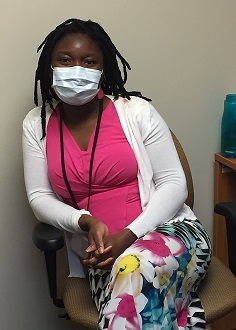

Tell Your Story: Adapting our Behavioral Health Care during COVID-19
August 25, 2020
My work as a Behavioral Health staff has transitioned to phone-based interactions with patients. This has allowed me to maintain contact with patients during this very stressful time, which has disproportionately impacted our patients. The ability to continue to offer behavioral health services by phone has allowed me to provide care for patients experiencing acute issues while navigating physical distancing and social isolation.
One example was a patient who began experiencing domestic violence after the pandemic began, when the stay-at-home order was active. We were able to work together via phone visits, along with Patient Resources staff and her PCP, to provide support to her, adjust medications, and develop a safety plan. After I spoke with her for telemedicine visits, I would coordinate with Patient Resources and her PCP regarding housing and medical needs. Additionally, during one telemedicine visit the patient shared acute medical concerns related to breathing, and I was able to coordinate with triage nursing staff who then spoke with the patient to manage acute symptoms. The teams worked really well together particularly given we were all in different places physically, and all parties were able to offer their help for the overall care plan. She was able to get her partner out of her current apartment, and find a new place to live.
Meghan, Behavioral Health
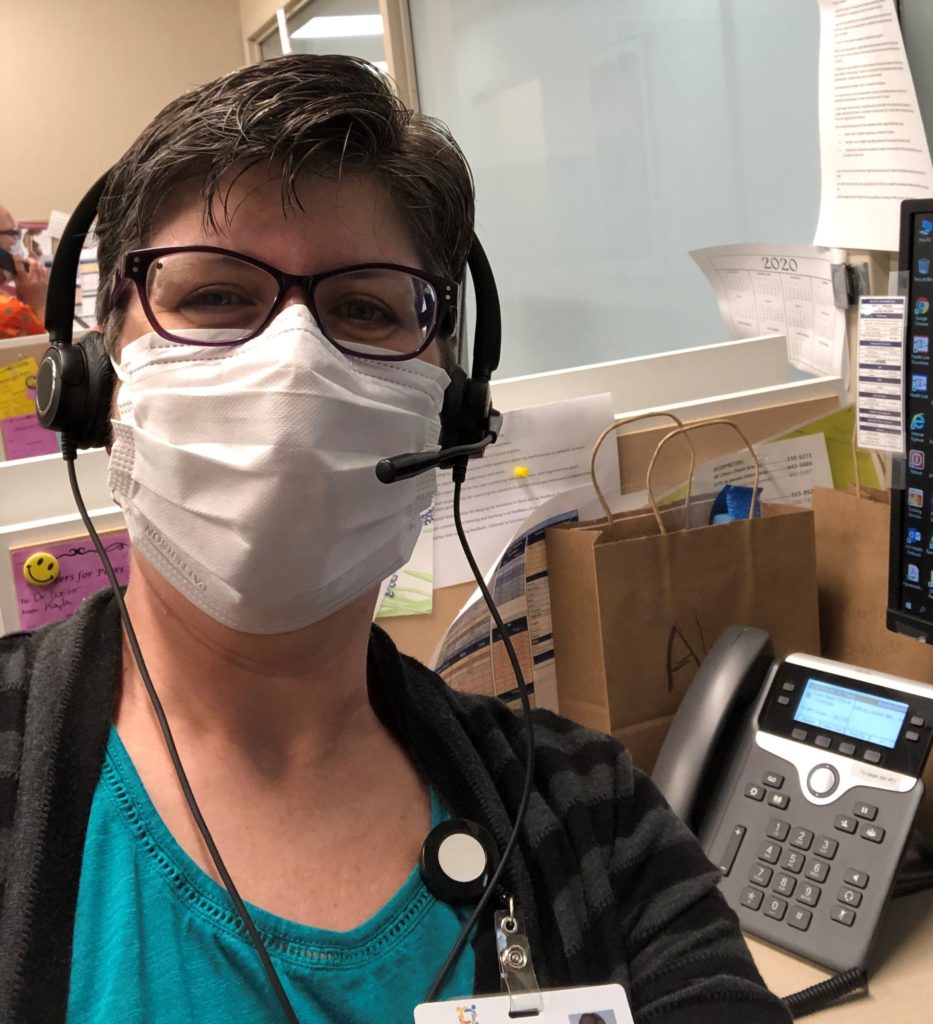

Tell Your Story: Interpreter Services during the pandemic
August 19, 2020
Since the pandemic began, every direct care provider has quickly been forced to change the way they deliver care to prioritize safety for patients and staff alike. Access interpreters are no exception. As a result of the pandemic, our staff of 11 interpreters are working remotely via telephone. While each interpreter could offer a unique example of how we help improve the quality of care for patients and providers each day, there is a collective story we have in common.
During non-pandemic times we rely heavily on multiple senses to interpret. We capture the spirit of a message by relying on our ears and eyes to take in all verbal and nonverbal cues to render complex communication into a second language in fractions of a second. While we look cool and collected, our brains are battling full speed through vocabulary, grammar, syntax, tone, style and register in two different languages, striving to keep full meaning intact–all the while checking for indications that both parties are understanding one another.
During the pandemic each interpreter has lost their sight, and it seems that our ears also betray us. The phones are attracted to amplifying background sounds so the instrument quietly placed on a tray during a procedure sounds comparable to nearby construction. We are continuously clarifying to make sure that important messages spoken behind masks and shields can still be communicated effectively–helping to strengthen the patient-provider relationship. In our downtime, our small team also provides (written) translation services for all Access clinics, as well as for our website and Communications team.
In carrying out our work we often have the opportunity to repeat the words of patients giving thanks. One such example is a patient who thanked Dr. Parker Hoerz and the nursing staff that continuously called to check on her while she was very ill at home. According to the patient, while she was sick at home, the nurse called her house right on time. The patient’s spouse was also very ill, but was reluctant to seek medical care. When the nurse spoke with the patient, the nurse also answered questions regarding the patient’s husband. The patient said that if it had not been for the nurse advising her husband to seek medical care, things could have ended badly for her husband. As interpreters, we take immense pride in taking part in moments like these.
All in all, our Interpreter Services team works well together and across all departments and have adapted well to the challenges were facing. We serve the Access’s mission by helping communicate potentially life-saving and life-changing information, and we make it look good!
~ Karen, Interpreter Services
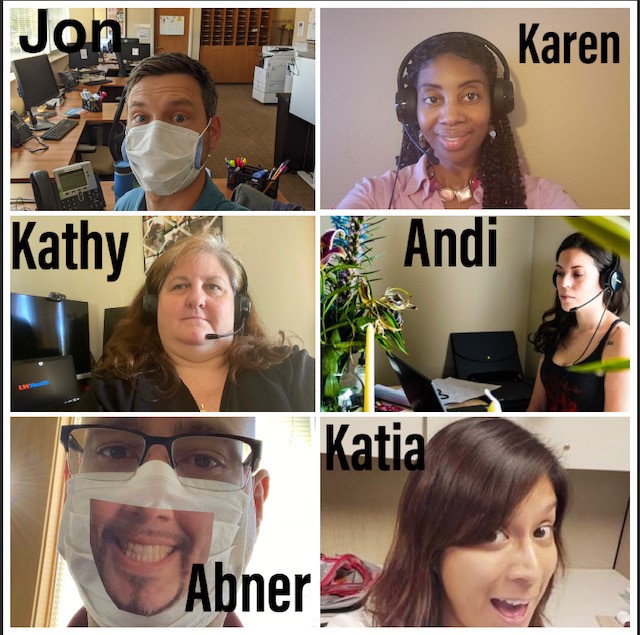

Why BIPOC Populations Continue to Struggle with Mental Health and How to Help
July 20, 2020
Black, Indigenous, and People of Color (BIPOC) populations around the country, including in Wisconsin, have sadly bore the brunt of the COVID-19 pandemic. Access Behavioral Health Provider Martha Saucedo explains why BIPOC populations continue to struggle with mental health during the pandemic and how our community can help in a NAMI (National Alliance on Mental Illness) Dane County blog post.

Resources for Telemedicine Visits
July 16, 2020
Throughout the pandemic, our telemedicine efforts have allowed us to provide safe and timely care to our patients in need. Each week, we are able to assess and treat more and more patients because of our ability to perform those visits on the phone or through video.
Telemedicine visits are especially effective as it allows patients to get the help they need without a significant disruption to their other responsibilities. And, as we live through the pandemic, these types of visits can help eliminate exposure to other sick patients.
Remote visits are not right for every medical condition, however. Sometimes an in-office exam is necessary for treatment and diagnosis, but there are many common conditions that can be treated safely and effectively using telemedicine technology.
Video visits are especially effective as it allows providers the ability to see the patient and help assess conditions. The ability to see each other can help build a connection between the patient and the provider.
Access is now offering video visits for our patients through VidyoConnect – an application that can be accessed through a patient’s phone, laptop or home computer.
If a patient agrees and is scheduled for a video visit, the patient will then be emailed instructions on how to access and use the VidyoConnect system. Access also has instruction guides for the apps on our Patients page on our website. Patients also can contact our Call Ceneter at (608) 443-5480 if they have questions or need help accessing your video visit.
Video visits and telemedicine visits will help patients receive the care they need during this extraordinary time and help Access meet the needs of the community as we work together through the pandemic period and beyond.

Patient Advisory Councils during the pandemic
July 9, 2020
Our Patient Advisory Councils are made up of patients who meet regularly with leaders and clinical staff to help improve both the patient experience and the overall quality of care we offer.
Both our English-speaking and Latinx patient advisory councils are important factors in helping us determine the best ways to support and advocate for our patients. As part of the Council, members are given an opportunity to use their experience as a patient to provide feedback on topics directly affecting patient care.
This is especially true in the middle of the COVID-19 pandemic and why the Councils continue to meet regularly – in virtual form – to ensure the care, services and safety measures that we are providing are meeting the needs of our patients and offer ways in which we can improve our work going forward.
One particular way in which the Councils have helped is in regard to telemedicine. Telemedicine became a critical way for us to provide care during the pandemic. The advice offered by our Councils have helped in the way we communicate and plan for telemedicine visits in the present and moving forward.
The pandemic, and our response to it, are ever changing. The ability to meet with the Councils regularly helps us plan more effectively, making sure the patient voice is heard in these important decisions.
We invite interested patients to join our Patient Advisory Councils and advise us in the care provided to our patients. If you are interested in joining the Access Patient Advisory Councils, please contact Paul Harrison at (608) 443-5544 or email: paul.harrison@accesshealthwi.org.

Work to be done in the evolving pandemic
June 29, 2020
Ken Loving, MD
We know that the pandemic will be part of our lives for the near future. This update provides the latest on our progress toward the future of care at Access, as we work each day to sustain our patients and create a more equitable community for us all.
Please watch this video to learn more:

Breaking down barriers to care through telehealth
June 25, 2020
More people are accessing medical and behavioral health care than ever before through telehealth. While necessities of physical distancing during the COVID-19 pandemic led to this increase, virtual visits have broken down barriers to care and are helping improve health equity.
Telehealth visits makes it possible for Access to meet more needs in our community and will become a mainstay of the care we offer to patients moving through the pandemic period and beyond.
The need for Behavioral Health care has increased by about 40 percent during the pandemic. Most – 90 to 95 percent – of Behavioral Health visits have been via telephone and in some cases via video. Many medical visits are also now being done through telehealth, currently about 30 percent.
Patients who once needed to take long bus rides, arrange time off work and perhaps find childcare can now get support or care easier through a 30-minute virtual visit at a time convenient for them.
“Our patients are incredibly resilient and have endured many stressors and adverse experiences while navigating the pandemic and everyday life. Telehealth allows us the opportunity to offer increased access in many ways to meet patients where they are,” said Dr. Beth Zeidler Schreiter, Chief Behavioral Health Officer. “The Behavioral Health team adapted quickly with compassion and teamwork that demonstrates a deep commitment to Access’ mission.”
Many medical visits are also now available via telehealth. From well-child checkups for children who do not require immunizations to follow-up chronic care, if a provider does not need to physically examine a patient, a phone or video visit provides many advantages.
Making telehealth visits available on a continued basis by phone will be important to keep access equitable and bridge the digital divide.
Patients who wish to have a virtual visit currently can request this option when scheduling their appointment.

Racism is a public health crisis that calls us to do more
June 22, 2020
Ken Loving, MD
Over the course of the last 15 weeks, I have shared the story of Access Community Health Centers as we drastically changed our care to meet the needs of our patients in the COVID-19 pandemic. It’s been an honor to share this journey with you.
The pandemic is far from over. In March, we used phrases like “post-pandemic” and “back to normal.” We now understand that we remain in a rapidly changing environment with significant uncertainties for the future. In fact, the only certainty is that COVID-19 is now a part of our lives and will remain so for a very long time.
The pandemic has amplified the systemic racism and health disparities experienced by our communities of color. Data in Wisconsin shows that while African Americans make up about 7 percent of the general population, they account for 25 percent of the deaths. Latinx people also make up about 7 percent of the population and account for 33 percent of COVID-19 cases.
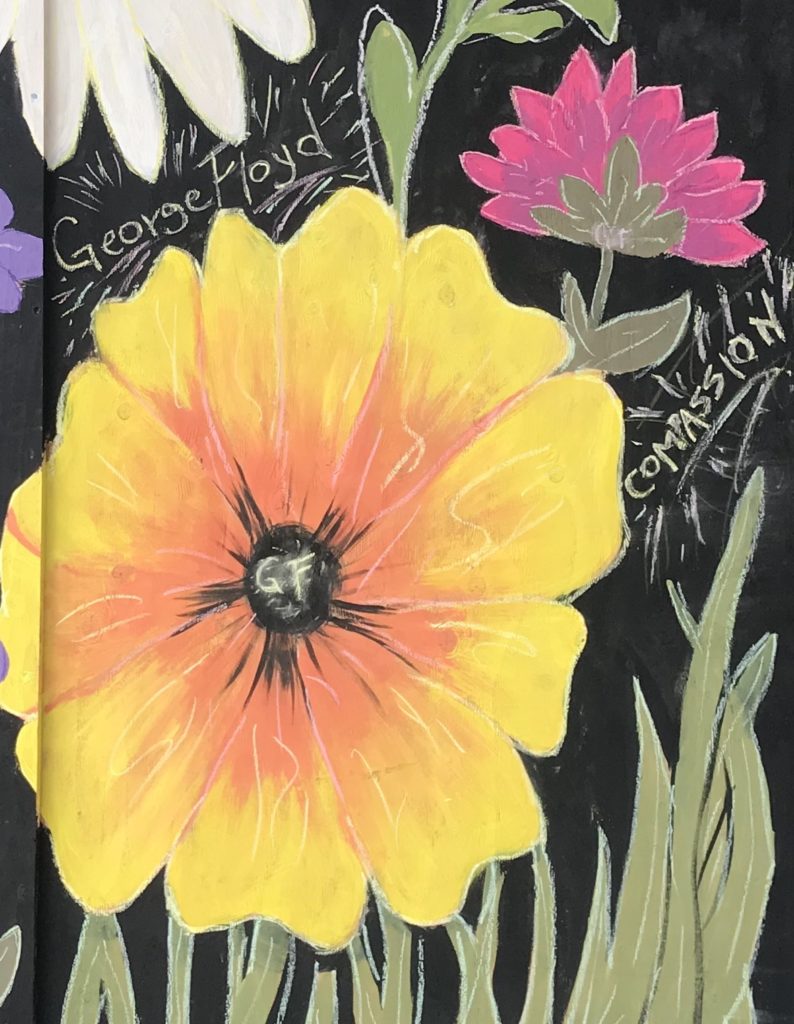
Since the death of George Floyd, we’ve been reminded of the affliction of racial injustice and violence toward African Americans that is so deeply rooted in the history of this country. Other communities of color are not spared from racism, violence, lack of opportunity and discrimination. The national movement to establish community health centers like Access began in the late 1960s as a direct response to the inequities in health care that existed then and sadly persist more than 50 years later.
BLACK LIVES MATTER to community health centers across the country, and to those of us who represent Access Community Health Centers.
I want to tell you about what we are doing to address these inequities, and I’ll preface it by saying that we are not doing enough, and we must do more.
We have a dedicated and diverse board of directors who guide our work and to whom I report. We have a Diversity, Equity and Inclusion Committee of the board that meets regularly to evaluate our work, both externally and internally.
We have helped lead the work of the Dane County Health Council, which includes leaders from SSM, UW Health, UnityPoint-Meriter, Group Health Cooperative, United Way of Dane County, Public Health Madison Dane County and the Madison Metropolitan School District. Our work is focused on improving the health of black infants by developing community health workers and doulas to support black families.
We partner with and support the Foundation for Black Women’s Wellness, One City Schools, Second Baptist Church, Nehemiah, the Urban League of Greater Madison, Centro Hispano, the Hmong Institute, Latino Health Council and many other community organizations that share our work.
We have two patient advisory councils, one English speaking, and one Spanish speaking, that meet to offer ideas, to review plans and to take an active role in improving the care we provide.
More than 30 percent of our staff self-identify as people of color. We consult with Debbie Biddle, a certified Diversity Professional and founder of the People Company to help us advance our work. Our staff teams bring diversity training and leadership development to each employee.
I think it is fair to say that we have started the journey to improve diversity, equity and inclusion in our organization, but again, it is not enough, and we must do more.As our friends, advisors and supporters, you make this work possible. I hope that you will continue to see our work at Access as an extension of your own commitment to end racism and the health and social disparities it creates. Together we can help make our community healthier and stronger.
Thank you for your continued commitment and support.

Immunizations during COVID-19
June 19, 2020
James Omohundro, MD, Access Pediatrician
An important aspect of the care that Access provides is the care we provide for children. Last year, more than 40 percent of the patients we served were under the age of 18. The care that children receive includes well child visits, screenings, behavioral health assessments and immunizations.
Immunizations are especially important in a child’s regular care. They help minimize the development of vaccine-preventable diseases at the specific ages when children are most at risk for these illnesses and the complications of the infectious diseases that are covered by the vaccines.
During the pandemic, Access has worked to make sure children and families keep on track for their immunizations as other appointments and procedures have been delayed due to the State’s Safer at Home order and our social distancing measures.
In the first month of the pandemic, we restricted access to children above 18 months of age, in order to minimize exposure risk while still prioritizing the primary vaccine series for children most at risk for vaccine-preventable diseases. Additionally, in some instances, families have also delayed or canceled immunization appointments due to fears of potential exposure coming into the clinic.
We have since lifted any restrictions and work to prioritize and maintain access to appointments for children needing vaccines and routine well child care and encourage families to bring all children in for their recommended vaccines.
Access has taken all the recommended precautions for healthcare facilities, starting with thorough patient screening to separate any patient with potential symptoms of COVID-19 from asymptomatic patients. Our respiratory clinic has been physically separated from our or essential care clinic with a different entrance and separate heating/cooling system. All patients and staff are screened for symptoms on entrance to the clinic and patients are immediately roomed on arrival to eliminate time spent in the waiting area. Rooms are thoroughly cleaned between every patient visit and all recommended personal protective equipment is used throughout the clinic to minimize risk of viral transmission. In my opinion, I think that our clinics have never been safer than now for prevention of transmission of any potential infectious diseases.
It is so important for children and families to keep on track for their needed immunizations. While it is always possible to catch children up on their missing vaccines, the biggest challenge for families is likely the need for additional clinic visits outside of routine well child care. But, the major risk in delaying vaccines is susceptibility to vaccine preventable diseases that could occur while trying to catch up.
And that is what Access is working to prevent.
If you have any questions about vaccines or would like to schedule your child’s well child visit, please contact Access at (608) 443-5480.

How we address health disparities day by day
June 15, 2020
Ken Loving, MD
These last few weeks and months have placed extraordinary challenges upon all of us.
Our community has seen the very real impact of the COVID-19 pandemic. The crisis has had a disproportionate effect on our patients. Many are facing unemployment, food insecurity and the loss of health insurance coverage.
Our patients and staff have also felt sadness, pain and anger in response to acts of violence against African Americans and other communities of color both here in our own community and across our country.
This week, I would like to share some of our patients’ stories with you. They highlight the work we do every day to address health disparities and help build a healthier and more equitable community.
Behavioral telehealth
One of our Behavioral Health Consultants provided care to a woman whose age and challenging medical conditions placed her at high risk for COVID-19 complications. During the pandemic, she was struggling more with depression and a deteriorating relationship with her partner. She started to voice concerns about harming herself, and the Behavioral Health Consultant was able to check in with her daily by phone. Our ability to provide this care over the phone allowed for close monitoring of symptoms, safety planning, and discussion of additional community resources she could use for support.
Timely dental care
We provide dental services to patients in Dane County as well as Columbia, Dodge, Iowa, Grant, Richland, Lafayette and Sauk Counties. A woman from Baraboo was having a tough time scheduling an appointment locally. She was in pain and needed to be seen right away. She called Access and spoke with our dentist who was staffing triage that day. The dentist reviewed a picture of the patient’s tooth that she’d taken with her mobile phone and determined she should be seen urgently to prevent further infection and perhaps an abscess. Within the hour, she was receiving definitive treatment at our newly reopened Sun Prairie Clinic.
Prenatal care during the pandemic
A nurse recently spoke to a newly pregnant patient as part of a prenatal intake phone visit. The patient had been coughing and had also started to have cramping and bleeding.
We scheduled her an appointment right away at our Respiratory Clinic where we see any patient with symptoms of COVID-19.. As in this case, patients often have other medical issues in addition to Covid-19 symptoms. We were able to test her for COVID-19 and perform an ultrasound evaluation of her pregnancy. Thankfully, she tested negative for the virus and the ultrasound showed a normal first trimester fetus. She had her prenatal lab tests drawn and was scheduled for another appointment in several weeks. She experienced seamless care provided safely and efficiently.
Building trust
A long-term patient who received behavioral health care intermittently over the past 10 years scheduled an appointment with a Behavioral Health Consultant for general support. She had lost several loved ones recently, including her mother, to COVID-19. She had been especially troubled by George Floyd’s death and the systemic racism she’s experienced in her lifetime. She reached out in a moment of need because, as she said, “Access has always been there for me.”
We will continue to be here for the people who need us. Our work remains possible because of your generosity and commitment. If you would like to support our work directly, please consider making a gift here.

Tips for teens to adapt to change
June 11, 2020
Martha Saucedo, LCSW
Behavioral Health Consultant, Latinx Community Liaison
While students transition from online school to a summer schedule, the COVID-19 pandemic continues. That means yet another shift during a time of constant change. The transition is a good time to remind teens and children what they can to care of their wellbeing.
While change causes anxiety, it is important to know that we are all capable of adapting to change. In this video, I speak specifically to teens about how to develop tools and skills to adapt. Some tips include:
Creating and maintaining a routine that includes picking a consistent time to wake up, eat breakfast (even if it is something small), and get dressed. A routine where you do these things at the same time daily can help you adapt and reduce stress.
Connecting with others and find ways to laugh and enjoy activities or new hobbies that you want to try. Using technology to connect when you cannot get together provides a great social outlet. And laughter is, indeed, the best medicine. This releases endorphins and helps you feel better.
Getting regular exercise. Something as simple as a walk helps your body get oxygen and release endorphins and helps you feel better.
If you’re feeling overwhelmed, anxious or sad please reach out to your doctor or within your community for support.
The video below gives more tips on developing tools to take care of yourself.
How to take care of your mental health:

Meeting the unprecedented need for Behavioral Health services
June 8, 2020
Ken Loving, MD, CEO
One of the highlights of my last week was a video call with our Community Advisory Council, a diverse group of people from our community who we call upon throughout the year to provide support and advice to Access.
It again reassured me that we’re all in this fight together. As the number of COVID-19 cases increases to more than 800 in Dane County alone, the impact of the pandemic is felt across the communities and counties we serve.
As we open to provide more care, we expect to see a sharp increase in the number of people who need our services. High rates of unemployment translate into more people losing their employer-based health insurance and becoming uninsured or needing to enroll in BadgerCare.
We want to provide care to as many of them as possible.
In each of our practice areas–Dental, Medical and Behavioral Health–we are planning our work for the next stage ofthe pandemic.
The need for behavioral health services has never been greater and I would like to focus this week on our efforts to bring this critical service to our patients.
Behavioral Health is a routine part of primary care at Access. During the pandemic, we have seen a tremendous increase in the need for this service. These are unprecedented times in which we have all experienced disruptions to our daily lives and uncertainty related to our future. For the people we serve, these disruptions are even greater.
In addition to the stresses caused by the pandemic and the ongoing tragedy of racism and violence against African Americans that has been highlighted in ongoing protests around the country, our patients continue to experience the stresses associated with their circumstances of their daily lives. This week in the clinic, I saw a young mother who broke down during her appointment. She explained that she was about to be deported, leaving her two young children behind with their father. I was able to refer her to our Patient Resource team to help her find legal advice and support. Equally important, I was able to connect her with our Behavioral Health team for critical support.
We have seen an extraordinary number of patients reach out for support these past weeks. To meet this need, our Behavioral Health team has greatly changed how they offer care. While we have always offered phone consultation, today 98 percent of our visits now being conducted through the phone.
This change has been made possible in part due to the efforts of our behavioral health team. They have shown tremendous teamwork and flexibility these past weeks, ensuring that the needs of our patients are met.
The pandemic has brought into focus the significant digital divide present in our community. For example, while most of our patients have access to a phone, many do not have access to a smart phone or computer. As we work to include a video component to our behavioral health visits, we are finding that many patients do not have the needed technology. These are issues that we will continue to confront as we plan for the future.
The digital divide also has an impact on how we receive funding for our behavioral health services. To help meet the needs of patients during the pandemic, Access can now receive reimbursement for the behavioral health care we provide over the phone. This is not a permanent change however, and we are working closely with other community health centers to advocate for our patients in the long-term.
As our work continues in all areas of our clinics, I will update you about this work and the people we serve. Next week, I will share individual stories of some of the people we care for every day.
Thank you for being part of this work. Your support continues to make a real difference in the lives of our patients and our community.

Thank you for your support
June 5, 2020
Access Community Health Centers has experienced overwhelming support from the community as we work to provide care to our patients in the midst of the COVID-19 pandemic.
In March, we implemented a new model of care that adheres to social distancing guidelines and the prevention of the spread of COVID-19. These changes, while necessary, also limits the number of patients in which we can see on a daily, weekly and on a monthly basis.
The disruptions and the financial impact caused by COVID-19 will most likely continue for months and even years to come. At the same time, Access needs to plan for the future, to ensure that we will be here for our patients in the long term.
Our community has wholeheartedly come together to help us do just that.
Organizations, businesses and individuals throughout our community have generously supported our efforts over the past few months to ensure that our patients can receive the care they need during this unprecedented time and in the months and years to come.
The generous support has come in many different ways, such as financial support and in-kind donations of time and services. It also includes people making face masks for our patients and local restaurants providing food for our staff.
This support has helped us rebuild and adjust our care to meet the current need, while keeping an eye on the future needs for our patients and our staff.
It has also reinforced the reasons why Access and community health centers are so important – especially now. Our patients, community partners, business partners, donors and staff are collectively working together with a common purpose: to create a healthier and more equitable community for us all.
THANK YOU to all who have demonstrated their commitment to Access by supporting our work during the COVID-19 pandemic. Our efforts during this crisis would not be possible without your support.
By no means are our efforts complete. We will work to ensure the needs of our patients are met and that we are prepared for anything that may come our way in future. As we navigate this crisis, we will continue to draw upon your counsel and your support.
Thank you for all you do for Access and our patients. We will get through this together.

Building a healthy and equitable community for all
June 1, 2020
Ken Loving, MD, CEO
I am experiencing sadness, pain and anger in response to the recent acts of violence against African Americans and I know you are as well.
This violence contributes to the disparities that we address daily in our work. We do our best to remove barriers for patients and provide high quality, affordable health care so that everyone in our community has the opportunity to succeed. Our work is intended to lift up each and every patient we serve and especially focus on the struggles of communities of color.
I want to reaffirm our commitment to building a healthier and more equitable community for everyone. This work is at the heart of our mission to improve the health and improve the lives of the people we serve.
These last few months have placed extraordinary challenges upon all of us. This is a time when we must offer additional care and support to one other and to our patients. We will get through these difficult times together.
Our work goes on. More than two months ago, we radically changed the way we provide care for our patients at Access.
As the COVID-19 crisis evolves and affects more people in our community, the need for our services has never been more critical.
This past week, we began expanding dental care at our Dodgeville, Sun Prairie and Madison clinics.
We are offering care in ways that promote the highest level of safety for both patients and staff. We are focusing on incremental expansion of services, balancing the need for safety with the considerable needs of our patients.
We were pleased to welcome back additional dental staff who had been on paid leave. We are expanding services, continuing to treat patients with emergent needs, but also providing essential routine care. Next week we will add hygiene services to each site. We continue to bring new patients into the practice and will gradually increase the number of patients who receive care.
We are reaching out to our patients who have not received care in the last 10 weeks in order to continue treatment plans and address areas of concern. We also continue to serve dental patients through telehealth visits, where patients can speak directly to a member of our dental team.
Of course, safety remains our top priority. We have trained our staff extensively on the use of the new personal protective equipment that is now part of their daily work.
Following the standards set by the Centers for Disease Control, we are working to reduce or eliminate any aerosol-generating procedures that could increase the risk of COVID-19 transmission. Our hygienists will no longer use the ultrasonic scaler for hygiene but instead provide this work through hand-scaling. This is more labor-intensive for the hygienists and may increase appointment length, but it is a much safer process for our patients and our staff.
Additionally, we will continue to reduce the use of the high-speed hand piece used in many dental procedures such as fillings and instead provide alternate treatment to prevent and halt the advancement of cavities.
In the months to come, we will undoubtedly see more changes to how we provide dental care. We will continue to prioritize safety, provide the best possible care for our patients and expand to meet the increasing demand for our services.
Thank you for your continued commitment and support. We could not accomplish this work without you.

Safely providing care to more people in our community
May 26, 2020
Ken Loving, MD, CEO
As we cautiously and safely begin to expand the care we provide to our patients, I want to thank you for your continued support of our work at Access.
We know that repercussions from the COVID-19 pandemic will continue for our community, and that more people will need our care. We want to be able to help as many as possible in the months and years ahead.
This update provides you the latest information on our progress to expand our services in our Medical, Dental and Behavioral Health practices. Starting today, we are providing more options for routine dental care at all four of our clinics using a new model of care.
Watch the video below to learn more about our work today and in the weeks to come.

Safety is key in providing essential care
May 21, 2020
At Access, safety comes first for patients coming to our clinics for essential or urgent medical, behavior health and dental care during the COVID-19 pandemic.
The following measures create a safe environment at our clinics to meet the needs of our patients and our community.
Limiting the number of people in clinics: If telemedicine is a good fit to address your health concern, patients can meet with their provider by phone or video link instead of having an in-person visit.
We ask that you come to your in-clinic appointment alone if possible, with the exception of children and patients needing a caregiver.
Screening: When you come to the clinic, you will be screened for COVID-19 symptoms before being brought back to the clinical area. Staff are being screened for symptoms each work day as well. Any patient who has respiratory symptoms is scheduled for an appointment at our dedicated respiratory care location, now inside the William T. Evjue Clinic location where testing is available and free. Staff with symptoms are sent home and, if needed, tested.
Physical distancing: You will be taken to an exam room as soon as possible after completing screening and registration. If too many people are at the clinic at a time, you may be asked to wait in your vehicle or separate room if a vehicle is not available.
You will soon notice prompts or distancing reminders, such as directional signs and six-foot markers, and other measures at some registration desks.
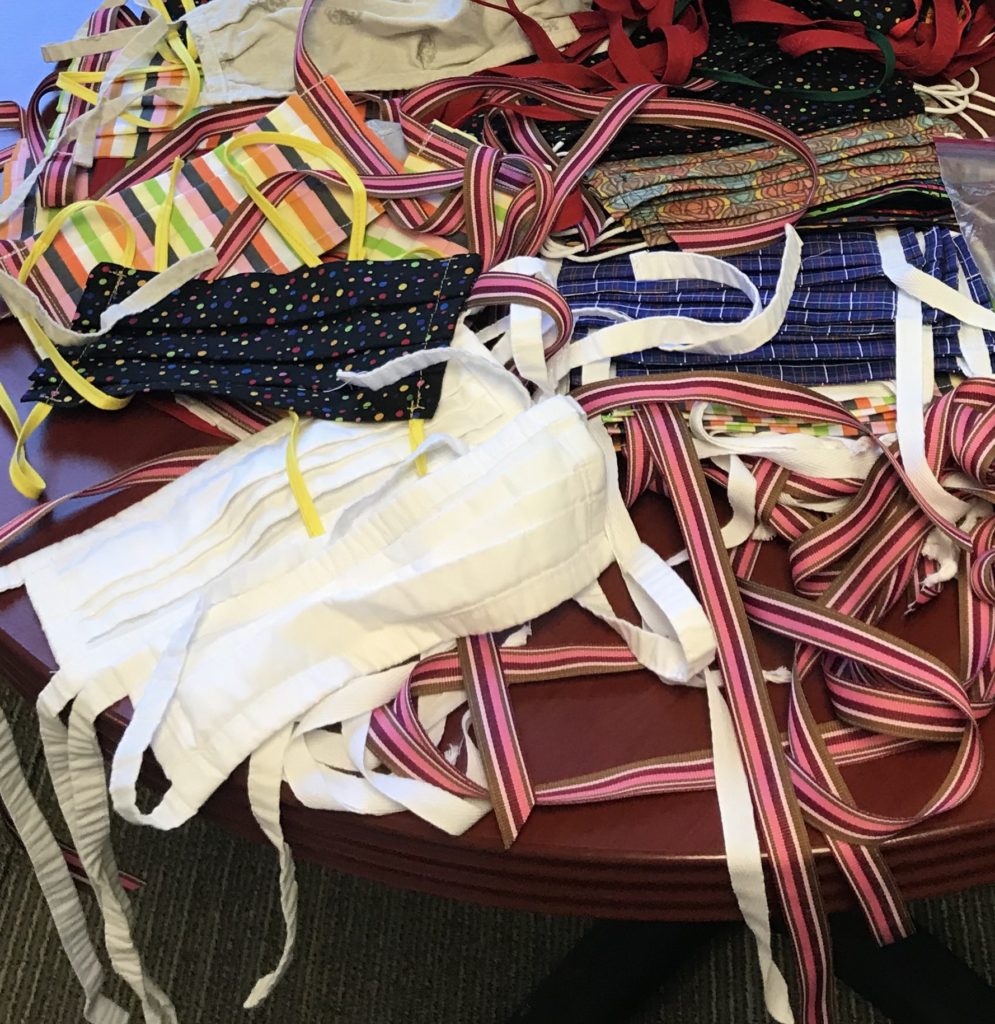
Constant cleaning: Inside our clinics, we have removed all magazines, books and other printed materials, and high-touch areas including door knobs, chairs, tables and countertops are wiped down throughout the day. In addition, our cleaning vendors focus on cleaning these areas at the end of each day.
Protection for all: In our clinics we request everyone — staff, patients, visitors, vendors — to wear a mask. We will have cloth masks available at the entrances for those who do not bring their own. During your appointment, providers and staff will wear personal protective equipment (PPE) including gowns, masks and face shields. Other staff will be working at physically distanced workstations.
These high standards for safety reduce risk and ensure that our clinics continue to be places where more people in our community can receive quality care.

Safely providing essential care to patients
May 18, 2020
Kevin Fehr, MD
Chief Medical Officer
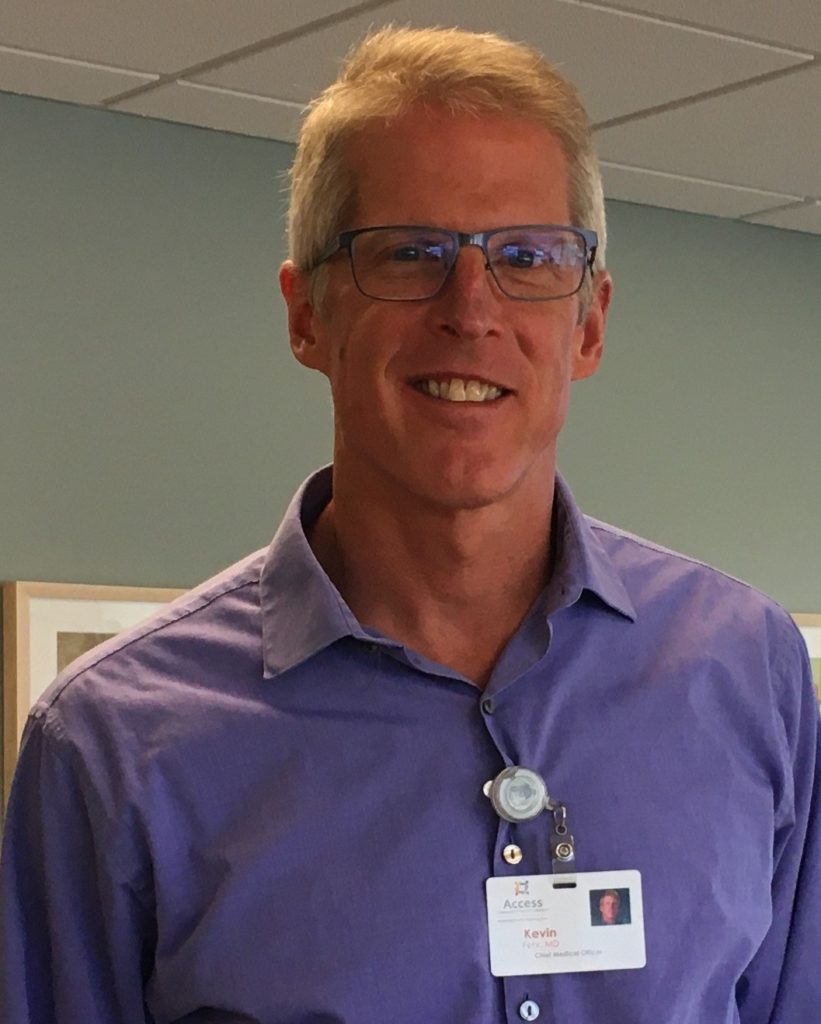
We have experienced a great amount of change over the past few months. The pandemic has forced us to innovate and change our model of care to meet the current needs of our patients.
And now, as we realize our pandemic response will continue into the foreseeable future, we need to continue our care related to COVID-19 and increase care opportunities for patients with other medical issues.
Today, May 18, we are opening an essential care clinic at the Joyce & Marshall Erdman Clinic and moving our respiratory clinic to a dedicated space at our William T. Evjue Clinic. The essential care clinic at the Evjue site will remain in place.
These changes will allow us to increase in-person care for a variety of patients, including those with chronic diseases like diabetes or high blood pressure or depression, who need regular, ongoing care that can’t be put off until the end of the pandemic.
I understand that people are so concerned about COVID-19 that they are delaying the care they need. Unfortunately, this can then lead to other health problems. For example, if a patient has kidney function that is declining and hasn’t had it checked in a while, or if they’re not monitoring their blood pressure, they could end up with serious health consequences that have nothing to do with COVID-19.
I think the challenge now is determining who needs to be seen, connecting with them, and finding ways to engage with them in their own care. Our staff is ready for this challenge. They have done an amazing job innovating and moving care forward since the pandemic began. Process improvement is something we’ve talked about for a long time, but now it’s alive and thriving. People are embracing ways to improve care for our patients and to support each other in the care team.
We need to find a way to live with this virus.
It is critical to have safety measures in place if we want to bring more people into the clinics. Patients with respiratory symptoms will continue to be seen in a separate clinic-within-a-clinic at our Evjue site. We’ll continue to use telehealth and other means to connect with patients, and only bring in people when it is necessary to address their ongoing care.
Additionally, we are limiting the number of people who come to the clinic, monitoring for symptoms, checking temperatures and requiring a face covering or a mask.
The changes we are making and the safety measures we are implementing will allow us to reconnect with more patients and help keep their health needs on track.
We’ll get through this together – now and into the future.

Planning safe dental care through the pandemic
May 11, 2020
Errin Pfeifer, DMD
Chief Dental Officer
At Access, we are proud to provide a full range of dental services to patient of all ages, from basic hygiene to complex restorative care. The COVID-19 crisis has changed the focus of our work, for now and into the immediate future.
Our main goal during the pandemic is to treat emergent need, keeping patients out of urgent care and emergency rooms so those facilities are free to focus on COVID-19 patients. Our work now focuses on serving patients experiencing swelling, trauma, bleeding or severe pain.
Currently, in-person dental care has become a smaller part of the care we are providing. Dental triage has now become a larger aspect of our care. Dental triage is a process by which the staff member who answers the phone also completes the initial screening and defers any patients who might want or need routine care to a later date.
If a patient expresses issues related to pain, swelling or trauma, they are transferred to a dentist to discuss their concerns. Patients can send photos to a secure email to help with their diagnosis, and the dentist can help a patient manage an issue at home or decide to schedule an in-clinic appointment – usually the next day.
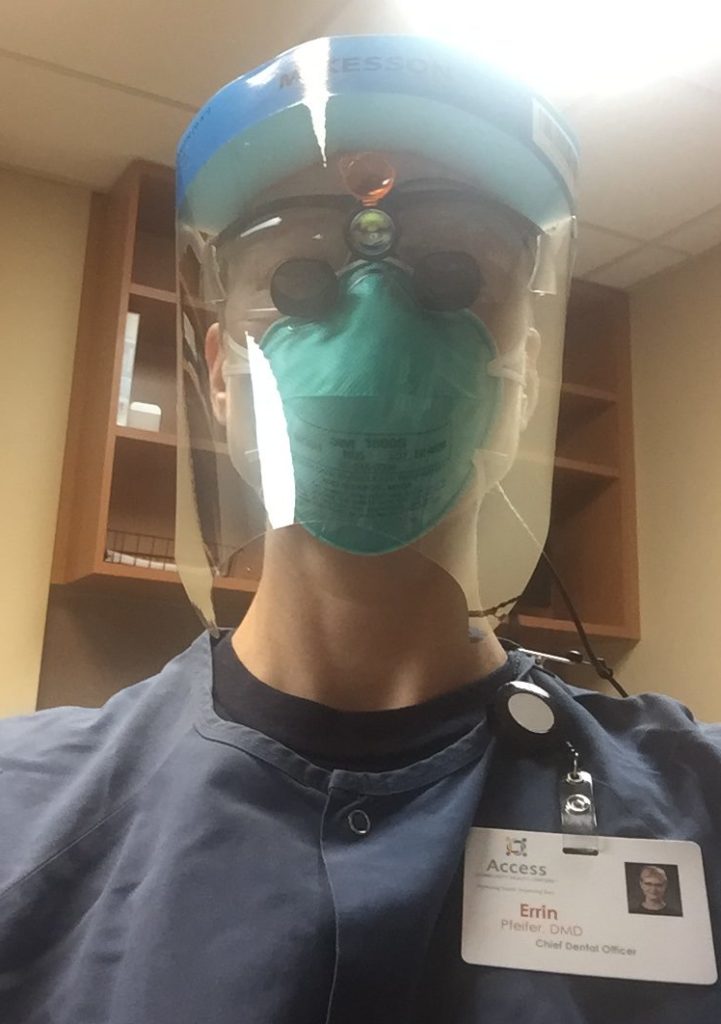
This keeps most patients reassured about their dental concerns and brings into the clinic those who need our help emergently. It also has allowed us to identify and provide care to more than 50 new patients during the pandemic.
Many of our patients receiving in-clinic treatment need care to alleviate pain, often by way of a dental extraction. Other patients are coming in to have their dentures or partials repaired so they can continue to eat effectively.
One of the greatest challenges in providing these types of in-office care is making sure that both staff and patients are safe. COVID-19 is a respiratory illness passed through oral secretions. We have increased the use of personal protective equipment for staff, making sure that patients are also well-protected.
Additionally, when patients are in clinic, social distancing is practiced whenever feasible. We have virtually eliminated the use of waiting rooms and patients are given masks for the times they are not in active treatment.
Dental disease does not go away during a pandemic. As we look to the future, we will have a slow increase in what we can offer for more of the routine types of care that our patients need. We have been looking to the American Dental Association, Wisconsin Dental Association, and state guidelines to help guide our plans to open for more care. Of course, safety of our patients and staff remains of paramount concern and guides each decision we make and every workflow we implement. We are working diligently to obtain adequate supplies of Personal Protective Equipment (PPE).
When we begin to provide more opportunities for in-clinic care, we will look to begin using alternate ways to treat cavities and gingivitis that will halt disease progression. These will improve patients’ dental health and keep staff and patients safe.
In the near future, dentistry will focus more on disease mitigation, rather than traditional models of disease removal and replacement of structure, such as drilling and filling for cavities. Longer term, I hope to see a more blended model, with some traditional drilling as necessary, but also the use of disease-arresting medications.
Returning to pre-COVID treatment models completely would require immediate chairside testing for COVID-19 or a widely distributed vaccine. Until then, I believe the pandemic may cause a real paradigm shift for dentistry and planning the evolution of our practice is an essential endeavor.
Whatever may change in how we practice dentistry, our commitment to improving the health and improving the lives of our patients remains absolute.

Helping provide the basics is a community project
May 7, 2020
One of the things that sets Community Health Centers like Access apart is our ability to provide care that considers all the factors that impacts the health of our patients. Our team of Community Resource Specialists (CRS) focuses on connecting patients to the resources that everyone needs to access care and be healthy.
Fundamental resources have become in greater demand as a result of the COVID-19 pandemic. Many people have lost employment and income, insurance and access to necessities.
Providing this assistance to patients is how Access fulfills its mission to improve health and improve lives.
“It’s very rewarding to know that we are able to be there for them and help them navigate through this time,” said CRS team member Claudia Salgado.
Through strong community partnerships, we can connect patients with what they most need.
Health coverage
Options have expanded for people needing coverage such as BadgerCare and other insurance types. This has quickly opened access to for those who are newly unemployed and without health insurance coverage.
Affordable care and medication
Access established an Emergency Discount Program for patients who need help paying for care and medication. Providing a greater discount through the pandemic has given those in communities that often do not qualify for programs like BadgerCare or the Affordable Care Act a way to get care that is affordable.
Food assistance
People needing help putting food on their table have multiple options in our community. Our list is constantly updated to provide people the most efficient way for them to provide a meal for themselves and their family.
Lighthouse Christian Church and School in Madison, in collaboration with the African American Council of Churches (AACC), is one of these options. Volunteers pack and distribute 100 to 300 hot meals, in addition to providing a full food pantry and economic assistance to those in need. Efforts like this are possible through strong community collaboration with agencies including Second Harvest Food Bank and the United Way of Dane County.
Housing help
With the pandemic, more people are looking for help finding shelter and paying rent. Both individuals and families are contacting us for help finding a place to stay. The community has stepped up with additional places that our CRS staff can refer them to and partners such as Centro Hispano which has an established fund to help pay for housing.
Our CRS team can assist patients in finding the best options for health coverage, financial help, food resources housing and more. They are there to navigate the application process with them and remove language barriers to getting what they need.
Patients needing help with resources can call (608) 443-5480.
In addition, contact United Way of Dane County’s 2-1-1 line to access a wide variety of assistance in our community.

Working to reduce behavioral health stigma
May 4, 2020
Elizabeth Zeidler Schreiter, Psy.D
These are unprecedented times. We have all experienced disruptions to our daily lives and uncertainty about the future. The COVID-19 pandemic has drastically changed how we work, play, and re-charge. Addressing emotional health and wellness is vitally important, now more than ever.
In this crisis, it is critically important to reduce stigma associated with behavioral health. We need to foster conversations related to emotional health and wellness and ensure that people have clear pathways to receive help. People throughout the community are being affected by this pandemic – especially our most vulnerable residents. This may involve job loss, financial strain, food insecurity and other stressors that can affect mental health and wellness.
At Access, we actively work with our patients to address these other social determinants of health and make connections to available resources in our community.
We offer behavioral health as part of our primary medical care services. Before the pandemic, our behavioral health team worked predominantly face-to-face with our patients, taking into consideration both verbal and non-verbal communication. We quickly adjusted to support physical distancing while ensuring patient access to crucial mental health care.
We began offering telephonic behavioral health visits to patients and are exploring options for video/audio support as well. Currently, approximately 95 percent of visits are being provided by phone, so we continue to support individuals with mental health and substance use disorder treatment needs, while also minimizing the risks of COVID-19 transmission.
In the past six weeks, we have conducted over 586 telehealth encounters to patients who needed behavioral health care.
I am continually humbled by the resilience of those we serve as we navigate these changes together.
Last week, we met with a patient with complex medical conditions. She was experiencing increased anxiety in response to the pandemic and changes in her regular access to specialty care services. We were able to engage in a mindfulness intervention over the phone, complete guided imagery, explore the mind-body connection and then assist the patient with scheduling a same-day virtual visit with her medical provider. The patient asked for a follow-up appointment with the same behavioral health consultant, noting the ease of access and an appreciation for connecting her with needed services so efficiently.
In addition, more patients are seeking care for substance use disorders. We can quickly connect patients with lifesaving treatment options including medication assisted treatment when appropriate. We also use behavioral strategies to promote recovery and we address co-occurring mental health concerns if needed.
I am so very proud of the entire behavioral health team. Their flexibility, teamwork and effective communication has ensured continuity of care for our patients at this critical time. We are finding new and innovative ways to provide care that will remain long after the pandemic is over.
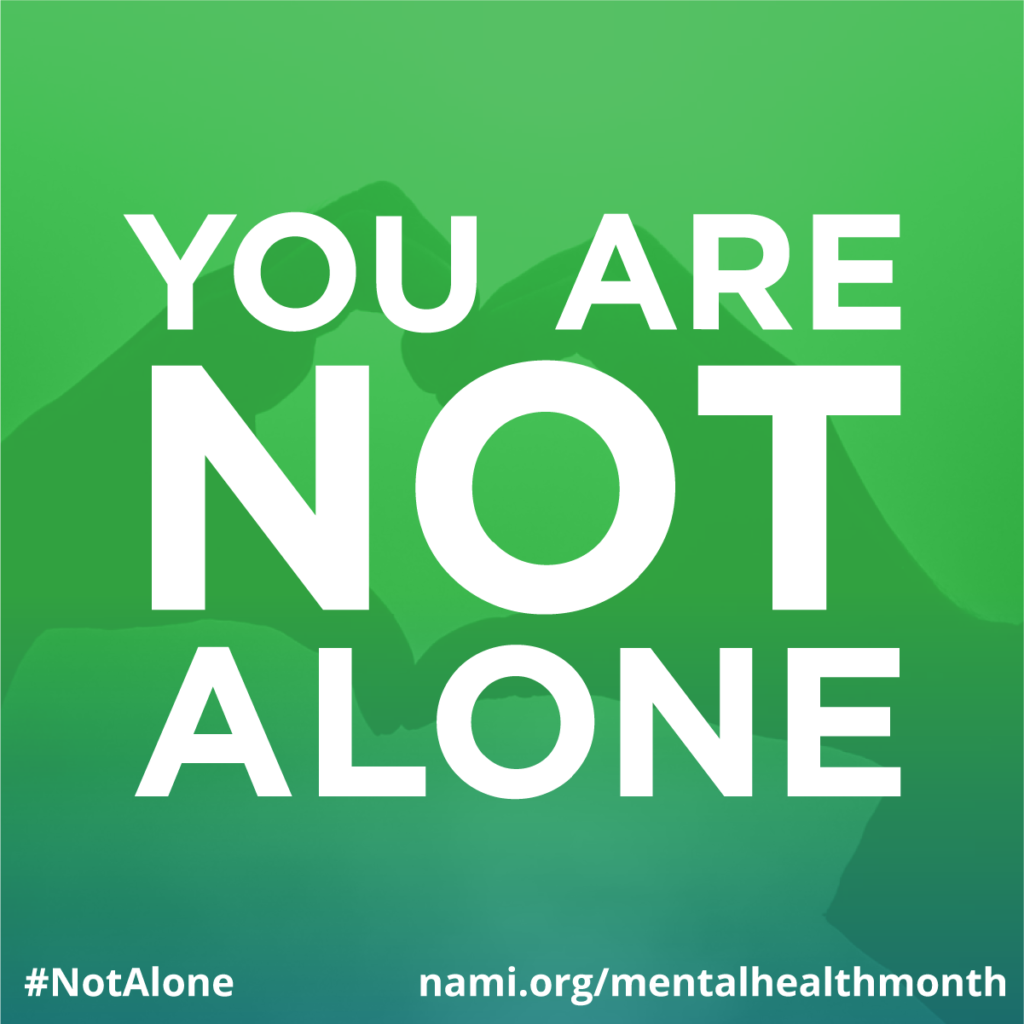
May is Mental Health Awareness month. I hope we all can come together this month to bring increased awareness to mental health, promote resilience and reduce stigma.
If you or someone you care about is feeling overwhelmed with emotions like sadness, depression or anxiety, please know you are not alone. Be kind to yourself. Engage in daily self-care activities and give yourself permission to reach out for additional help/assistance via available behavioral health supports such as:
- Substance Abuse and Mental Health Services Administration (SAMHSA) Disaster Distress Helpline: (800) 985-5990
- National Alliance on Mental Illness (NAMI) HelpLine: (800) 950-6264
- National Suicide Prevention Lifeline: (800) 273-8255

Exceptional care under extraordinary circumstances
May 1, 2020
Over the past six weeks, Access has continued to provide exceptional care to our patients and to the community during the COVID-19 pandemic. The following are a few examples of the critical care that Access has been able to provide during this extraordinary time:
- One patient arriving at our essential care clinic was experiencing shortness of breath and cough upon her arrival. While this may have been a patient who could have been re-directed to the respiratory clinic under ordinary circumstances, she was also a person who was previously diagnosed with chronic obstructive pulmonary disease (COPD). We did not want to risk having this patient exposed to the COVID-19 virus at our respiratory clinic, but also wanted to protect patients at our essential care clinic if this patient was experiencing COVID symptoms. The patient’s doctor made a decision to see the patient in the parking lot of the clinic to make sure she received quality care as quickly as possible while also not jeopardizing the patient’s health any further or putting others at risk in the clinic.
- We cared for a 12-year-old boy who had been to the emergency department over a weekend with fever, pain and facial swelling. He was new to Access and living in Madison with his grandmother. The boy was developing slowly from a dental perspective, and decay in two of his teeth were an issue. We were able to receive a verbal consent over the phone from his mom to extract two of his primary teeth during his appointment. The ability to take quick action during this extraordinary time helped reduce a lot of pain and prevent serious infection for this child.
- At our respiratory clinic, a 37-year-old homeless patient living at a shelter was able to receive an evaluation and testing for COVID-19. Afterwards, the provider arranged the patient’s transfer to a community isolation facility at the Lowell Center for 14 days of self-isolation. To get the patient to the facility, a taxi ride was arranged by a member of our RN staff, and plans were made for the UW Health pharmacy to deliver medication to the facility to aid in his recovery.
- At our respiratory clinic, a 63-year-old patient with a severe alcohol use disorder and a history of COPD with worsening cough was evaluated for COVID-19. The patient had a history of repeated ER visits and hospitalizations until stable housing was established and the treatment of her alcohol use disorder was begun. During their evaluation, it was determined a follow-up Vivitrol injection (for alcohol dependency) was due and should be given during this visit. UW Health pharmacy staff were able to bring the medication in a cooler to the clinic in a quick manner and RN staff were able to administer the Vivitrol injection right away.
- At our respiratory clinic, in dental services, a 64-year-old woman with COPD had a dental extraction performed after her tooth, which had been scheduled for extraction, began to worsen. To complicate matters, the patient had been on antibiotics for a lung infection recently and was very nervous to be out of her house, given her risk factors. The protections and safety measures taken at the respiratory clinic allowed the extraction to be completed safely, effectively and efficiently.

Staff on the front lines of care
April 29, 2020
As Access shifted its focus to care for patients who have COVID-19 symptoms and essential care needs, staff members from across the organization stepped up to meet the challenge. Thanks to them, we can provide medical, dental, behavioral health and community resource services to thousands of people who need them, while keeping our patients, staff and our community safe from the virus.
These stories tell what it is like to be on the front lines of care at our clinics. They paint a picture of the essential function of a community health center.
Julia Green, RN
Being a front-line worker and providing care during this pandemic has meant many changes. Working at the Joyce & Marshall Erdman Respiratory Clinic, where we are providing care and testing for anyone experiencing cold and flu-like symptoms, flexibility and thinking creatively are the new norm.
We provide more care to patients through telemedicine and have greatly reduced staffing at the respiratory clinic to maintain social distancing.
To protect our patients and ourselves from contracting becoming sick, we allow only four patients in the waiting area at once. We quickly get each patient’s information — symptoms, vitals and risk factors — before taking them to a room. Everything from the computer, equipment, and chair is disinfected between each patient. The security guard even cleans the clinic door handles.
Patients have expressed many moments of gratitude for the work that we are doing. But what I most enjoy is giving patients and their families cloth masks donated from the community. We have masks in sizes to fit anyone 2 years old and up that we can give out free. Patients have been very thankful for these cloth masks. It feels good knowing that Access is able to help keep patients and their families safe while they are out in the community, hopefully helping to flatten the curve.
Being part of an organization that has pulled together and has not only helped our patients, but each other, during this difficult time has been very rewarding.
Nakkea Fitzgerald, Registration Specialist
There have been many changes in my work to answer patient calls and schedule them the care they need through the pandemic. Our work has been ever changing to meet needs, and each day is different. This keeps us on our toes!
We maintain social distancing by placing call center staff within our workspace and in different areas of the office. This way, we have enough people to answer patient calls and can get patients the care they need quickly.
A number of the patients I’ve talked to have expressed how much they appreciate that we’re still here helping them.
Demetra Sifakis, DDS
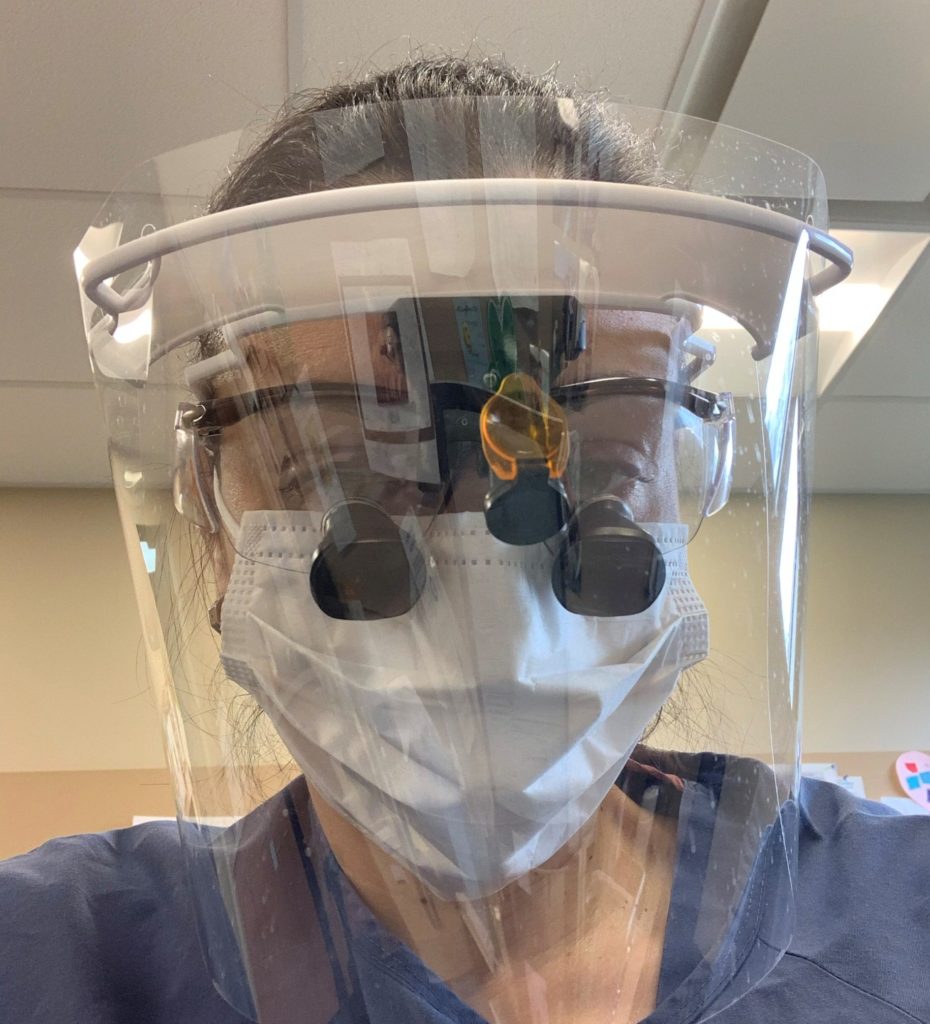
My workday has changed drastically to focus solely on emergency dental care. Patients leave the safety of their homes to come in because they have a dire need. This often leads to heightened emotions of concern for patients, and for us, creates a sense of purpose and duty.
Providing emergency dental care now involves being safe, decisive, swift and direct. Dental providers triage patients by phone and in most circumstances, the patient can email us photos we use to diagnose which patients need to be treated.
Every day that I have had the opportunity to treat patients during the pandemic reminds me of why I became a dentist. For every patient we treat in our clinic that is one less patient that will go to the ER or urgent care seeking help.

Prenatal care during COVID-19
April 27, 2020
Sara Downie, BSN RN
Access Prenatal Manager
The way Access has provided health care to our patients has changed in many ways due to the COVID-19 pandemic. Our prenatal care program is no different. We have made a variety of changes to ensure each patient (and their growing baby) are provided the best possible services under our new model of care.
In the first week of the pandemic, our entire staff worked together to find the best way to minimize the number of in-clinic prenatal visits, while ensuring patients received all the services they needed in a timely and effective way.
When the first stay-at-home order was issued, we received a tremendous number of calls from concerned prenatal patients. We were able to reassure them that Access had already put in place significant patient safety and social distancing measures.
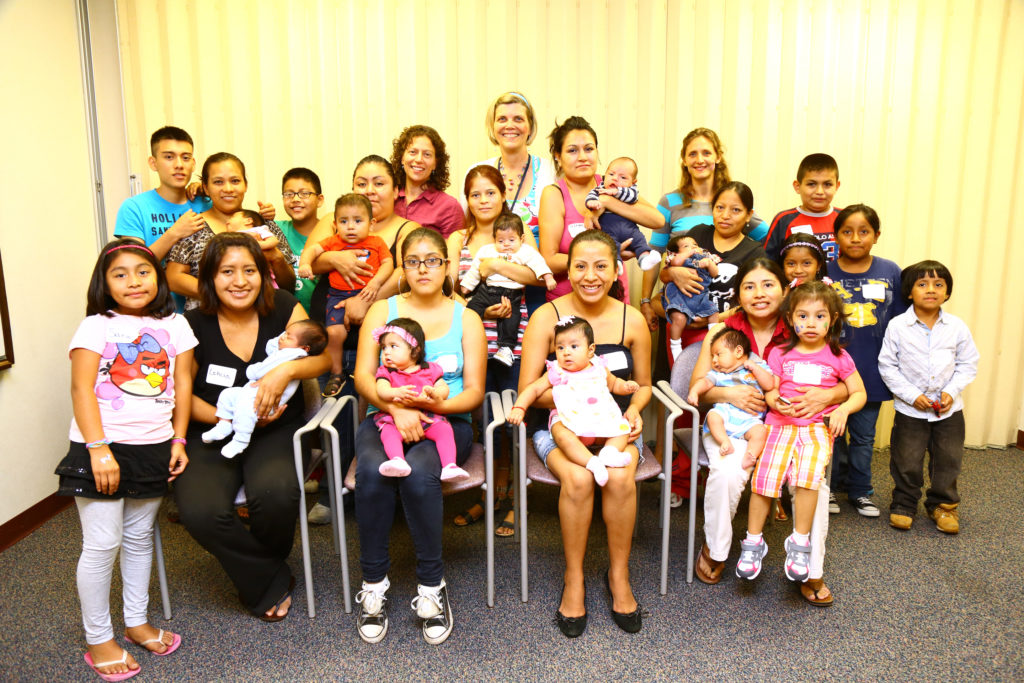
As part of our restructuring of care, Access moved all essential care to our William T. Evjue Clinic. Moving to one clinic for in-person visits was a challenge. We have worked to coordinate visits so that patients can get multiple needs met at once. We can do this through a variety of ways; for example, coordinating an ultrasound with an upcoming OB visit or coordinating postpartum visits with other family appointments.
Our prenatal team still provides a full range of care and services, but we do this now in a way that keeps patients safe during the pandemic. Essentially everyone is doing their part, but in a different way. Both the midwives and family practice doctors are providing telemedicine for at least half our total visits. If a patient doesn’t have to come in for something specific such as labs, providers can conduct a visit by phone. Additionally, we have made lactation consultation easily available for mothers through telemedicine.
Telemedicine visits allow us to provide care quickly and efficiently. For example, our prenatal nurses can take an initial call from a patient, complete the new patient intake process, assist the patient with obtaining coverage and start the patient’s prenatal care in one phone visit.
Many of our patients struggle with finding affordable, reliable transportation. Because patients often rely on a bus or a cab to get to the clinic, offering a telemedicine visit is not only efficient, but also reduces both their anxiety and their potential exposure.
As we look to care for patients after the pandemic, we hope to use what we have learned to provide our patients with the most efficient and effective care–allowing us to meet patients where they are and provide them the best care in the most accessible way.
In a sense, it’s what Access is all about.

Meeting patient needs through telemedicine
April 22, 2020
More than 1,000 patients have received care through telemedicine visits at Access during the past month. This technology gives us the ability to provide care — medical, dental, behavioral health, resource counseling and more — while keeping everyone in our community healthy and safe through social distancing.
This innovative tool helps us take care of our patients by getting people care when and where they need it through the COVID-19 pandemic.
Patients who have concerns, not only about exposure to the virus, but also about transportation, time away work and finding childcare, are able to talk to a health care provider, behavioral health consultant, dentist and community resource specialist over the phone. While telemedicine visits currently are available only by phone, we are exploring the addition of video.
Having the telemedicine option has provided people experiencing anxiety a way to connect with our behavioral health team and strategize about ways to manage their concerns. It also provides patents who are experiencing dental pain a way to discuss and assess their condition with a dentist.
Others experience efficiency by using telemedicine. By working with our healthcare partners, we have been able to combine appointments for our prenatal patients, saving each a trip to the clinic and limiting exposure concerns.
This approach to care is an example of how we are better meeting the needs of our patients and doing our part to limit risk of exposure during the COVID-19 period.

Meeting ongoing essential needs
April 20, 2020
Ken Loving, MD, CEO
A little over a month ago, we radically changed the way we provide care for our patients at Access.
As the COVID-19 crisis affects more people in our community, the need for our services has never been more critical. In the last month, we have seen more than 2,000 patients in our medical, dental and behavioral health practices and provided COVID-19 tests to more than 100 patients.
We continue our respiratory clinic at the Joyce & Marshall Erdman Clinic and our essential medical and dental clinic at our William T. Evjue Clinic. Essential dental care is offered at our Dodgeville Clinic, serving six counties in southwestern Wisconsin.
We have also developed new ways of caring for our patients during this emergency, providing more than 1,000 telemedicine encounters to patients across all three of our areas of service.
However, along with these new approaches and new ways of providing care, we still need to meet the ongoing, essential needs of our patients.
For example, each year, more than 250 women receive prenatal care at Access. Working with our healthcare partners, Access has revamped how we provide our prenatal services. By combining appointments, offering telemedicine visits and providing resource counseling by phone, we can provide care to these patients efficiently and effectively.
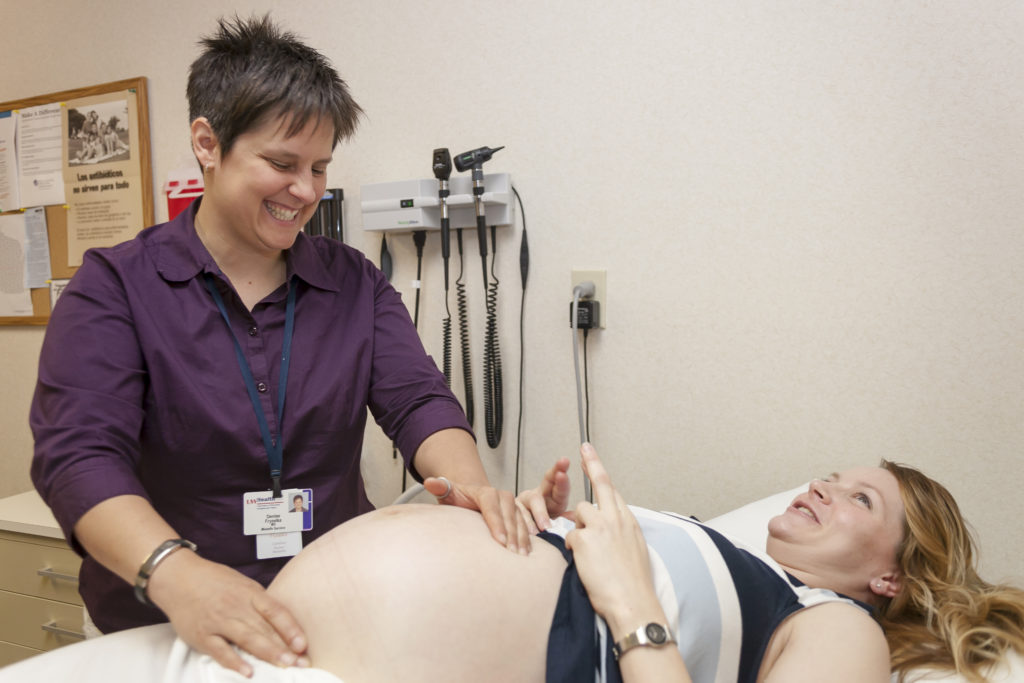
One young woman shared with us how relieved she was that she could receive care in this new way, saving her an hour bus ride and limiting her exposure during the pandemic.
Our approach to prenatal care is one example of how we can better meet the needs of our patients by lessening transportation costs, promoting social distancing, and limiting risk of exposure.
Additionally, this week we helped new patients establish care at Access, providing emergency dental care to 17 new patients.
Of course, your support and encouragement these last four weeks have made this work possible.
A community health center is, by definition, based in the community itself. Our patients, community partners, business partners and donors work together with a common purpose: to create a healthier and more equitable community for us all.
I will continue to reach out regularly to update you about our work and the people we serve. Thank you again for your ongoing commitment. We will get through this together.
Learn more about new provisions in the CARES Act which encourage charitable giving to COVID-19 related charities.

Flattening the curve
April 17, 2020
At Access, we have changed the way we provide care to ensure that we are doing our part to flatten the curve and limit the spread of the COVID-19 pandemic.
We have been able to achieve this through a few large-scale changes, such as creating a respiratory clinic at our Joyce & Marshall Erdman Clinic for those with respiratory and COVID symptoms, but also through a variety of smaller but equally impactful ways, including:
- Monitoring for COVID-19 symptoms for patients entering our essential care clinic at the William T. Evjue Clinic.
- Creating social distancing standards at our clinics for both staff and patients.
- Offering telemedicine visits to medical, dental and behavioral health patients.
- Offering patient resource services via telephone.
- Encouraging prescription delivery or offering a system of prescription pick-ups for patients in their vehicles.
- Creating a paid leave program for staff members.
- Offering work at home options for staff members
- Requiring all employees to wear masks at our clinics as well as our administration office.
- Monitoring for COVID-19 symptoms for employees entering our work sites.
By taking these measures, our face-to-face encounters at our clinics over the past month have dropped by 90 percent in dental and 65 percent in medical – an impressive measure of success during this period of social distancing.
However, the need for in-person care remains, and the measures we have taken have also allowed us to provide essential care to our patients in a safe manner at our William T. Evjue Clinic. While many regular checkups and non-essential appointments have been postponed or are now provided telephonically, those with urgent needs continue to have access to care at this clinic, which also helps keep people out of urgent care or emergency rooms when they do not need to be there.
Together with Wisconsin’s stay-at-home order, the social distancing measures that Access has taken over the past month have been an effective tool in preventing the spread of COVID-19. In the weeks and months to come, Access will do all that is necessary to continue to flatten the curve and help our community and our patients get through this extraordinary time together.

Tools to manage your mental well-being through COVID-19
April 15, 2020
Martha Saucedo, LCSW
Behavioral Health Consultant, Latinx Community Liaison
While we are staying safe at home, many have feelings of isolation, fear and anxiety. Even though we are all going through the COVID-19 pandemic together, it is difficult to feel like we are really together while keeping apart.
This series of short videos provide support and tools to help people manage their mental wellness through this difficult time. The messages have become an important way to support the Latinx and broader community and normalize the feelings that we all share in dealing with COVID-19.
In addition to relaxation techniques, meditations and the importance of developing a routine while home, we discuss topics including grieving. Many may not recognize that they are grieving those things in our lives that came to an abrupt and unexpected halt. Employment, important events like graduation, sports tournaments, time with loved ones and social time with friends.
It is normal to feel sad, angry and frustrated about these things. Writing down or journaling your feelings about all that was lost is a great way to identify them and describe the emotions that you are feeling. Doing so will help to bring you serenity and acceptance.
It is important for us all to realize how easy it is for our brains to enter a state of fear and make that the default. It is even more important to know that we all have the power to control that response and how to do this. By starting your day with some physical activity you enjoy and by expressing gratitude instead of going on social media or with news, we can set a different tone for our day. Everyone has simple things to be grateful for even amidst a difficult situation. Acknowledging these can bring you calmness and positivity to help you manage the more difficult things in your day.
During the pandemic, it seems like things are out of control and it is scary. I hope that these messages give you ways to help your emotions. Watch them as many times as you want, in the moment and become more centered with the feelings you are experiencing.
Doing this can not only help you manage your own well-being, but provide the calm that your immune system needs to keep healthy, safe and strong.
Heart Meditation
In addition to being part of Access Community Health Center’s Behavioral Health team and Latinx Community Liaison, Martha is a member of the Latino Health Council and Latinx Mental Health Council.
See more of Martha’s videos here. Martha also shared valuable mental health health information during the pandemic on LaMovida recently. You can find it here.

Stories to share, thanks to give
April 13, 2020
Ken Loving, MD, CEO
This is the time of year that we gather together at our Celebration of Service Dinner to recognize both the work of Access and the community support that makes this work possible. Although our dinner was cancelled this year due to the extraordinary events around the COVID-19 pandemic, there are still stories to share and thanks to be given. Watch the video below to hear these stories and learn about the work we are currently doing in our clinics.
Thank you once again for your extraordinary support. We will get through these difficult times together.

Care at our Respiratory Clinic
April 10, 2020
Kevin Fehr, MD, Chief Medical Officer
Our primary goal for setting up our new model of care during the COVID-19 pandemic was to help people socially distance – both patients and our own staff. I think we have been successful in doing that by separating our two clinics and having people with respiratory symptoms come to just one site – our new Respiratory Clinic at the Joyce & Marshall Erdman Clinic.
I have been overwhelmed by the flexibility and the adaptability of the providers and the staff to adapt to this new model of care. We asked staff at both the Respiratory Clinic and the Essential Care Clinic (at the William T. Evjue Clinic) to make enormous changes in a very short period of time. These are changes that would normally take months or years to implement. We were able to get them done in a matter of days and weeks.
Our staff has been just incredible in their willingness to step up and support the team, to innovate and to make sure that patients are receiving quality care as we transition to a very different model of providing health care. I think the teamwork and the ways people are communicating have been exceptional in these difficult times.
At the Respiratory Clinic, where I work as a provider, we have two or three nurses, two or three support staff and three providers on site each day. This model of care has allowed us to have a smaller staff that is comfortable with putting on the personal protective equipment (PPE) and completing the testing that is required. We have maintained a consistent group of staff and rotated a few people in to assure we have enough backup.
When a patient comes in to the Respiratory Clinic, a support staff member meets them at the door and proceeds to take their basic, vital information. Patients are then taken to one of two mobile workstations that are located in what was previously the clinic’s waiting room. The nurses meet with the patient to gather information about their symptoms and their medical history. From there, the patient is brought to an exam room. The provider then gowns up in full protective gear, meets with the patient and does any testing they may think is pertinent.
As you can imagine, patients coming to the clinic are worried about their symptoms in the midst of this COVID-19 pandemic. Yet despite the new way of receiving care, our patients have really appreciated having access to talk to a provider to see if testing for COVID-19 is needed. Additionally, we have been able to offer testing to patients who would not otherwise have access to it.
We have now seen over 100 patients at the Respiratory Clinic since we started. These are patients who may have ended up in the emergency room or urgent care, or would have been seen at our other clinic, intermingling with people who did not have respiratory symptoms. We have been able to support the community during this crisis by providing care to some of our most vulnerable citizens, and helping keep people out of urgent care or emergency rooms when they do not need to be there.
We are focused on continuing to provide exceptional care to our patients even as the volume of work increases or as we start to enter a surge of COVID cases. I think we have set things up really well and have exceptional teams in place to handle that.
When things return to normal, we are hoping that we can continue to build on some of the things we have learned in handling the pandemic, like telemedicine, that will shape our model of care into the future.

Sustaining our work, sustaining our patients
April 8, 2020
Ken Loving, MD
In our third week of caring for our community amid the COVID-19 pandemic, I would like to thank all of you for your ongoing generosity.
Our work as a community health center would not be possible without this support. As we navigate this crisis, we will continue to draw upon your counsel and your support and update you about our patients and our work.

Telehealth
We continue to use our Joyce & Marshall Erdman Clinic to see patients with fever and respiratory symptoms, and to test for COVID-19 when indicated. At our William T. Evjue Clinic, we are caring for patients with essential medical and dental needs. Our Dodgeville dental clinic staff continues to provide care to patients from six southwestern counties.
More and more we use technology to communicate with our patients across all three of our areas of service. This is consistent with our goal of supporting social distancing while still meeting the needs of our patients in the most effective way possible.
Our medical team is looking for every opportunity to provide care over the phone when it makes sense for the patient. Our providers are reviewing their scheduled appointments and identifying patients who can be served with a telephone visit. We also have multiple providers available to serve patients who call us with urgent needs. Many of these telehealth visits provide care and support that is nearly equivalent to what we would have done in person.
Our behavioral health staff is working to meet an increased need for their services. Almost all our behavioral health consultants are working remotely, providing telehealth-based care to our patients.
Since we are limiting our dental services to urgent treatment, we have a dentist assigned each day to triage patient needs over the phone. This week more than 50 calls were received daily for dental triage.
We expect telehealth to remain an important tool for patient care as we manage our way through the pandemic.
Sustaining Access
We are actively looking at new ways to sustain our work in these challenging times.
We have been working closely with the state, the Wisconsin Primary Health Care Association and others to identify how telehealth services are eligible for reimbursement. We are evaluating options that may be available to community health centers through federal, state and local efforts.
While many of our staff are working in our clinics, many more continue working from home or on paid leave. Maintaining ongoing employment, compensation and health insurance for our staff remains a critical priority for Access. We must maintain our exceptional workforce to ensure care for our patients through the pandemic and in the months and years to come.
Sustaining Patients
Many of our patients are feeling the impact of the pandemic, with job loss and the loss of insurance coverage.
As part of our sliding discount program, uninsured patients who inform us that they are experiencing any hardship due to the pandemic automatically qualify for the greatest discount. We will offer this discount through May 1, and longer if needed.
In our pharmacy, any uninsured patient who informs us of a hardship is now given our greatest discount, with a $7.50 charge for a 90-day supply of medication. We will also be working with our colleagues at UW Health Billing to work with patients who have COVID-19-related expenses.
Finally, we are piloting an insurance screening for individuals who are contacting our Call Center to establish medical care, but do not have insurance. This process will inform potential new patients of coverage options as our sliding discount program.
Community Support
Thanks to the many of you who have demonstrated your commitment to Access by supporting our work during the COVID-19 pandemic. If you would like to make a gift to Access, you may do so on our website or by using this form.
We will get through these difficult times together. Thank you again for your extraordinary support.

Reflections on our work
April 6, 2020
Julia Weiser, MD, William T. Evjue/Essential Care Clinic
My first reflection on our work is how grateful I am for our leadership and the administrative teams who have calmly and deftly guided us through the upheaval of all our routines and norms. In the past three weeks, our clinic managers have met my anxious questions and concerns with such grace, and I am inspired by how they’ve led by example through all of this. I want to emulate their approach to crisis by being both more receptive and more responsive, more patient and more flexible.
My next reflections were on how grateful I am for our patients. The economic and social fallout of the pandemic has already taken an early toll on our vulnerable patient population. Despite outsized hardship and valid fears, nearly everyone I’ve seen or talked to has inspired me with acts of resiliency, courage, and compassion. I’ve also noticed that patients have been going out of their way to express their gratitude and support through all this, and I’ve come to realize that patients want to take care of us as much as we want to take care of them. I’ve never felt so keenly that our patients are not just recipients of our hard work, but an active part of our enormous team, who share directly in our organization’s goals and core values.
Finally, I’ve been reflecting on how grateful I am for the people I work with every day. I know it sounds odd, but I’m actually glad for all the meetings and huddles we’ve had recently. I’m profoundly grateful for the time I’ve spent with all my colleagues – other providers, nurses, support staff, behavioral health consultants, registrars, administrators. I’ve even had the chance to spend more time on the telephone with our front line phone operators (whose important work is so vital and appreciated during this crisis).
It’s always been a privilege to work with so many talented, dedicated people, and right now it is truly a unique privilege. With most of the population forced into isolation, I am grateful that I still get to witness firsthand those qualities which sustain my firm belief that we are going to get through to the other side of this pandemic together.
In the past two weeks, I’ve been inspired by countless acts of selflessness, grace, optimism, humor, generosity, patience, ingenuity, resiliency, courage, vulnerability, trust, honesty, and integrity. In the midst of fear and uncertainty, I’m grateful to be weathering this storm with my teammates at Access.

Patient Resources in a time of need
April 3, 2020
As we respond to the health needs of our patients during the COVID-19 pandemic, our patients (and many in our community) are also dealing with many of the difficulties that have resulted from the pandemic, such as job loss, reduction in hours and pay, and an inability to pay for bills that are occurring during this time.
At Access, our Patient Resources team is here to help patients who may be experiencing hardship during this extraordinary time. We have an ability to connect patients to the resources they may need – including housing referrals and food assistance, employment guidance and affordable health care counseling. We also have trained experts to answer questions and help patients find the best coverage under the Healthcare Marketplace, BadgerCare program and our sliding fee discount program.
As you can imagine, our Patient Resources team have been asked questions about food and housing quite regularly over the past few weeks, and our specialists are doing what they can to connect them with organizations and groups that are currently providing assistance. It can be an especially difficult process as some of the resources and availability can change on a daily basis.
But, despite all the disruption caused throughout our region by COVID-19 , our community has come forward to help support those in need. And, Access and our Patient Resources team is here to help our patients find the assistance they need throughout this trying time.
If you need help in finding the resources you need, please call a Patient Resources Specialist with any questions at (608) 443-5480.
Additionally, the following are a few helpful resources that may also help in the coming weeks and months:
- United Way 211 – Call 2-1-1 to talk to a specialist who can connect you to local programs and services that can help.
- Madison Metropolitan School District – Find food sites near you where lunch and breakfast will be distributed while schools are closed.
- Marketplace Insurance – If you need to apply for health insurance due to lost coverage.
- BadgerCare Plus – If you need to apply for BadgerCare Plus coverage.
- COVID-19 Unemployment Info
- Dane County Department of Human Services COVID-19 Updates

Reinvention is a continual process in response to COVID-19
April 1, 2020
Ken Loving, MD, CEO
Access has implemented a new model of care that meets the current needs of our patients, adheres to social distancing and prevention of the spread of COVID-19 and keeps our staff safe and financially secure.
The second week of our intensive response to the COVID-19 pandemic required us to continue to reinvent our care for patients and our support of staff members.
What remains the same, is our commitment to doing our work at the highest standard and for the greatest good, for both our patients and our community.
Thanks to so many of you who have reached out to us this last week to offer your support and guidance as we continue to work at the front lines of the pandemic.
Care for Patients
We continue to operate our Respiratory Clinic at the Joyce & Marshall Erdman Clinic, where we can test patients and staff for COVID-19. To avoid potential spread of the virus, any patient with cold or flu-like symptoms is seen there. All other patients are seen for medical and dental care at the Essential Care Clinic at our William T. Evjue Clinic. We also offer essential dental care at our Dodgeville Clinic, serving 6 counties in southwestern Wisconsin.
We are caring for more people who are now unemployed or underemployed, anxious about their future and concerned about access to health care, and we continue to take on new patients who need our services.
As always, staff spent a significant part of the week going the extra mile for patients. For example, our medical, dental and behavioral health teams are providing care to our patients through telehealth visits. Last week, patients received behavioral health support over the phone, a critical need in these uncertain times of anxiety and fear. Our dentists worked with call center staff to provide triage care to patients and setting appointments for those with urgent issues who might otherwise wind up in Urgent Care or an Emergency Department. We also piloted having one of our medical assistants working with a medical provider to care for a patient through a telephone encounter. Our goal remains to treat our patients efficiently, effectively and with the utmost compassion.
Our administrative staff and leadership dramatically changed the way they work, practicing social distancing by using technology to meet, share work and connect from sites across Dane County and beyond.
Supporting our Staff
I have been so impressed and moved by the extraordinary commitment by all our Access staff as we navigate the challenges of COVID-19.
While many of our staff are working in our clinics, many more are working from home or are on paid leave. Despite their own concerns about the pandemic and the economy, every day our staff remain committed to our patients and this new way of working together.
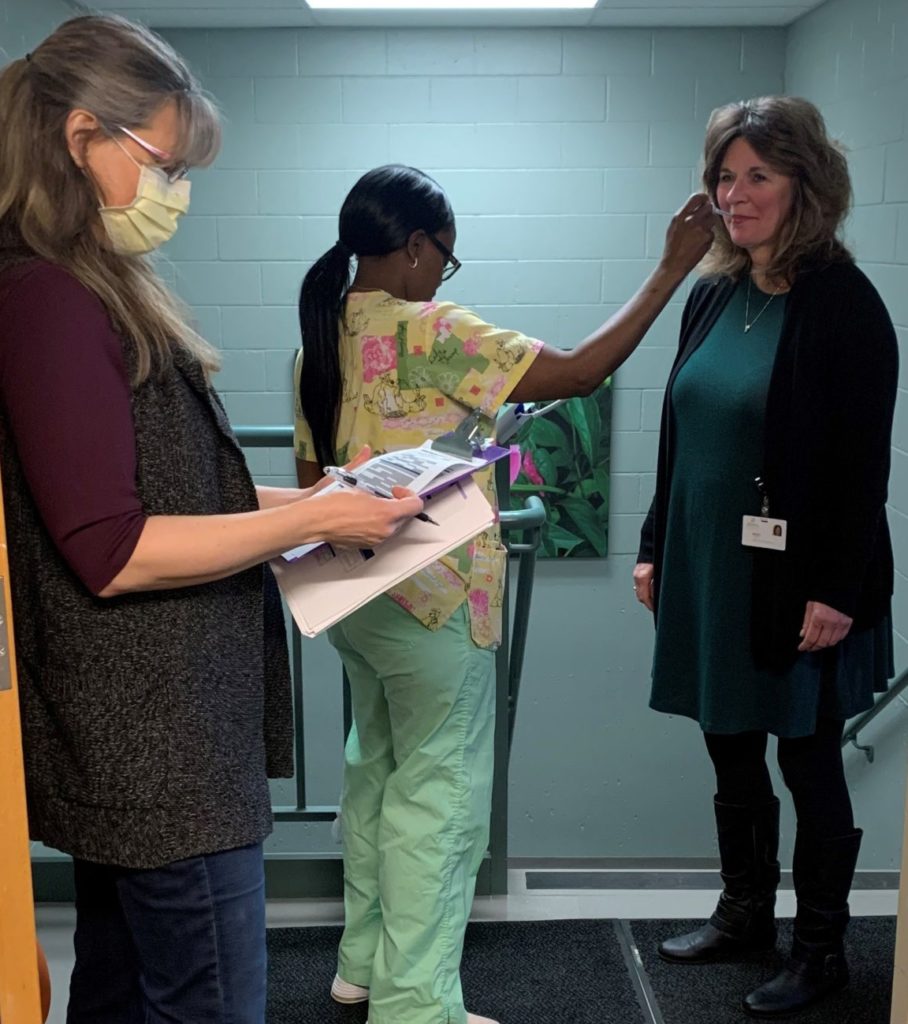
We remain steadfast in our support of our staff. We must emerge from this crisis with our staff intact. We need them in the moment to care for our patients today and will need them to do the same in the months and years to come.
Community Support
We will need your support to continue our work through the pandemic and into the future. Our face-to-face patient encounters have dropped by significantly, a measure of success during this period of social distancing. At the same time, it is deeply troubling from a financial perspective as we are paid for our work on a per encounter basis.
I know that you share a deep commitment to our patients and our work in this time of uncertainty and challenge. If you would like to make a direct gift to Access, you may do so online here or with this form.
We will continue to inform you of our work and the challenges of our patients, our community and our staff. Thank you for your tremendous, ongoing support.
We will get through this together.

Behavioral Health Care Resources
March 30, 2020
In the midst of all the many changes occurring at both our Erdman/Respiratory Clinic and our Evjue/Essential Care Clinic, the need for behavioral health care remains as strong as ever for our patients. In fact, during times like this, where stress management and coping are essential, we have noticed the need for behavioral health visits has only increased.
Our behavioral health care team has adapted to our clinical changes and the increased demand for services by making themselves available to meet with patients over the telephone, along with one staff member always being available in person at the WTE/Essential Care Clinic.
But, we also know that we can’t meet with everyone, and that many more people are being affected by the stresses and uncertainty of our current situation.
And so, our behavioral health care team has provided the following list of resources for patients – and for anyone who needs help – during this extraordinary time:
- Facts about COVID-19 (English & Spanish available)
- Taking care of your emotional health (English & Spanish available)
- Helping children cope with emergencies (English & Spanish available)
- Managing Stress and Anxiety
- National Alliance on Mental Illness (NAMI) Comprehensive Guide
- American Psychological Association (APA) Building Resilience
And, please remember, if you or someone you care about is feeling overwhelmed with emotions like sadness, depression or anxiety, or is feeling like they may harm themselves or others, please call 911.
You can also contact the Substance Abuse and Mental Health Services Administration’s (SAMHSA) Disaster Distress Helpline at (800) 985-5990 or the National Suicide Prevention Lifeline at (800) 273-8255.
Additionally, if you would like to talk to a behavioral health professional about issues regarding Covid-19 or any other behavioral health issue, don’t hesitate to call Access at (608) 443-5480. We are here to help.

Our Rapid Response
March 27, 2020
Ken Loving, MD, CEO
As you know, Access quickly created a new model of care for our patients in light of the COVID-19 pandemic.
Just over a week ago, our Joyce & Marshall Erdman Clinic on Park Street in Madison shifted its focus to one that serves patients experiencing any type of respiratory symptoms. Patients who are experiencing these symptoms can be evaluated and tested in a safe clinical environment. In just over a week’s time, we have provided numerous tests for COVID -19, along with other respiratory diseases. A special thank you to the staff who volunteered to be part of this care team. They truly exemplify our mission to provide high quality care for our patients.
Concurrently we converted our William T. Evjue Clinic to an “Essential Care Clinic.” Only patients who absolutely needed care were seen; for example, pregnant women, children under 2 years of age needing immunizations, patients with acute problems like severe depression, chest pain, a fall, or acute dental pain and infection. Patients are encouraged to call in to make appointments in order to best direct their care. We deploy a nurse in the vestibule of the clinic to ask screening questions and check the temperature of all patients and family members before entering the building. If patients arrive with respiratory symptoms, we immediately arrange transportation for them to the Erdman/Respiratory Clinic. Over the past week, we have been able to see many patients in need at this new Evjue/Essential Care Clinic, while offering even more patients the opportunity to receive care over the telephone or via MyChart.
As the week closed, we became more concerned about social distancing at the Evjue/Essential Care Clinic where more employees were located. On Friday, we changed seating arrangements and workstations and sent additional people home to work remotely.
I believe the work we have undertaken over the past week has truly shown Access at our best. We have been able to transform our model of care quickly to serve our patients and our community in the best way in the midst of such an unprecedented crisis.
I’m confident the work being done over the past week, and for the weeks to come, will be key in minimizing the spread of this virus and will help us all return to a normal way of life as soon as possible.